#and fascist italy is as far from that as it can get!
Text
Coming back to Tumblr after a really busy and difficult month to find everyone talking about Del Toro's Pinocchio really is something.
I have never in seven years participated in the Discourse but ooh the disrespect for the original novel is testing me.
Anyhow I'm back!! I have lots of writing updates to share (including a new WIP) and I can't wait to catch up on everything!
#i do like del toro really#pan's Labyrinth is one of my favourite movies but like#the things he said in the interviews for pinocchio are making my blood boil#like if you have to approach a novel with such a bad faith reading why even bother!!#all this fuss about pinocchio not needing to change to show he is human#like... guys... guys it's a metaphor omg it has never been about him being made of actual wood and having to turn to flesh#it's a metaphor !! once he learns to approach other with kindess#to be helpful and loving and take his own responsibilities#then he becomes a real boy because relinquishing a bit of selfishness for the sake of the community is what makes us human#plus pinocchio only works within its own very specific historical context#and fascist italy is as far from that as it can get!#it was a cautionary tale for kids (literally the second half of the story exists only because children requested it of collodi)#to spur them into going to school at a time when child labor was the Only thing and parents didn't see the point#of giving their kids an education at the cost of their labour#aaaah#anyway if you ask me about it i might talk more on the subject and i have so many Questions about adaptations and staying true to a story#i saw someone list pinocchio along with grimms fairytales and wanted to cry#like no pinocchio is a whole book there is no pinocchio before collodi it's not an oral tradition that was sanitised
1 note
·
View note
Text
As 400 million Europeans get set to elect 720 EU parliamentarians in June, polls are predicting big gains for right-wing populists. As a result, for the first time since the European Parliament was directly elected in 1979, it is expected to have a solid majority on the right. This will mark a “sharp right turn” for Europe, the European Council of Foreign Affairs (ECFR) recently noted. The consequences for European politics and policy are already coming into view.
The center-right European People’s Party (EPP) and the left-leaning Socialists and Democrats party (S&D) are again expected to finish in first and second place, although both may lose a handful of seats. The EU’s far-right groups, Identity and Democracy (ID) and the European Conservatives and Reformists (ECR), will improve their tally mainly at the expense of liberals and Greens. According to ECFR, populists are likely to be the top vote-getter in nine countries, including Austria, the Netherlands, France, Hungary, Poland, and Italy. In nine others, including Spain and Germany, they could emerge as strong second or third-place contenders.
ID—which includes the main anti-immigrant and Eurosceptic parties in Germany (Alternative for Deutschland or AfD), France (National Rally), and Italy (the League or Lega)—is likely to become the EU parliament’s third-largest group after elections are held between June 6 and 9. The ECR is led by Georgia Meloni, Italy’s prime minister and leader of the post-fascist Brothers of Italy party, and is home to Sweden’s Sweden Democrats and Poland’s Law and Justice party (PiS). If authoritarian Hungarian leader Viktor Orban’s Fidesz party, a member of the EPP until a few years ago, joins the ECR as expected, the far-right could claim a quarter of the total seats.
Political machinations already seem to be underway among some establishment parties to create cooperation with this newly powerful bloc. Experts say if the EPP, the strongest conservative party in the EU, welcomes far-right politicians in its fold or co-opts their policies, as it has lately been accused of, the balance of power in Europe will decisively shift to the right and have major implications for not just the EU’s common agenda but may also influence how member states decide critical policies.
“I think in our campaign we will ask the EPP to be pragmatic, to pick the alternative to a center-left majority,” Marco Campomenosi, a Lega politician and the head of the Italian delegation in ID, told Foreign Policy.
Experts say any such shift will have major implications for the EU as a whole, tainting its recent promises to pursue a humane migration policy and to establish rule of law at home that encourages democratic checks and balances. An empowered far-right may also keep coordination on a common defense policy to the bare minimum in the face of a looming threat from Russian President Vladimir Putin.
The EU’s flagship Green Deal climate framework, which has set a goal of net-zero carbon emissions by 2050, is also at stake, as the populists try to push the EU to erode its commitment to renewable energy development and other climate policies.
Charlie Weimers, a member of the far-right Sweden Democrats that supports Sweden’s minority center-right government, said, his party’s priority is to push for a “Migration Pact 2.0,” with more stringent measures to stop the influx of immigrants than already listed in the new migration pact. “We need to stop asylum,” he told FP over the phone. “We need breathing space to deal with the immigrants already here otherwise we can never catch up.”
Lega’s Campomenosi said, “it’s not about the money” but about the “trouble” immigrants make. (Under the new migration pact an EU member state which refuses to accept an asylum seeker should pay a sum of 20,000 euros to an EU fund.) “If there are too many immigrants they can’t be integrated,” he added.
Three far-right parliamentarians told FP that with bigger numbers in Parliament they will be able to apply more pressure on the EU commissioner to throw out or dilute the green deal.
It “needs to go away,” Joachim Kuhs, the acting head of the AfD delegation in EU which is polling as the second strongest party in Germany, told FP in his office in the parliament. “It should be repealed and replaced,” Weimers added.
The liberal groups say the center-right has strengthened the far-right by co-opting its policies and forming alliances in individual member states.
Pedro Marques, a vice president of the S&D group, said the EPP parties have been “eroding the Cordon Sanitaire,” erected to keep the far-right out of governments and important positions. “The EPP is dancing with the far right,” he added, with grave consequences for the future of the union.
The cordon sanitaire is crumbling in many European nations. In Italy, the far-right is in power, in Sweden the center-right government is backed by the far-right. In Austria, center-right and far-right have been in a coalition, and the latter is polling ahead of all others in the run up to national elections. In France, Marine Le Pen is leading the polls, and in Germany, the conservatives have hinted at future cooperation at a regional level with the far-right AfD.
The legitimization of the far-right isn’t limited to member states. Ursula Von Der Leyen, a member of the EPP and EU commissioner, has alluded to Meloni’s inclusion in her grouping. She said it wasn’t clear which parties will remain in the ECR after the elections and which will leave, and “join EPP.”
Hans Kundnani, writer of a book called Eurowhiteness, said the boundaries between the ID, ECR and the EPP have always been “very fluid.”
“As soon as Meloni indicated she won’t be disruptive in the Eurozone, that she won’t be pro-Russian, centrist pro-European EPP said that’s great, we don’t mind,” Kundnani said. “The center right has no problem with far-right at all, they just have a problem with those who are Eurosceptic.”
Experts say Von Der Leyen has often backed off on key policies to appease the far-right. Just over the last few months as the farmers protested against the provisions of the green deal, the far-right found another issue to mobilize against mainstream parties. During election season, Von Der Leyen quickly conceded and granted several concessions to the agriculture sector that will affect the 2050 net zero target.
The best example of how the EU commissioner validated the far-right’s worldview, Kundnani argued, was when she created a post for an EU commissioner to promote a European way of life.
“The big theme of the European far-right is that the immigrants threaten European civilization,” he said. When Von Der Leyen created the position, she framed “immigration as a threat to the European way of life,” and in doing so legitimized the far-right.
It is unclear if co-opting the far-right’s talking points benefits the center right in keeping their traditional voters from moving towards populists, but there is an emerging consensus that it strengthens the radical right in the longer run. For its part, the far-right has moderated its own positions on many issues to appeal to the voters more to the center. The far-right parties say they are no longer calling for an exit from the EU, but merely to reform it from within. They say they back Ukraine and not Putin.
Many parties on the far-right advocate return of border controls in violation of the EU’s founding principle of free movement of people and goods. Last year, the AfD described the EU as a “failed project,’’ while Sweden Democrats said they had “good reasons to seriously reevaluate our membership in the union.” There is still a lingering suspicion that the rank-and-file members of the far-right parties harbor sympathy for Putin. Last month, Lega’s leader Matteo Salvini deflected when asked if he blamed Putin for Russian opposition leader Alexei Navalny’s sudden death.
The parliamentarians of the ID and ECR with whom FP spoke expressly rejected Von Der Leyen’s proposal to appoint a dedicated defense commissioner to improve coordination among member states on matters of defense.
“We say that we want to manage immigration in a humane way, we can do better to manage the borders,” added Marques of the S&D. In response to the far-right’s demand to externalize the screening of asylum seekers, he said it was difficult to find credible partners. “We did this agreement with the Tunisian authorities, but when we tried to go there to check the conditions, to see how European money will be spent, they said we don’t want your agreement anymore. These have to be credible partnerships.”
The center-left S&D party simply dismisses the moderated stances of far-right parties as a charade. They believe the far-right simply wants the benefits of being in the union, not the costs that sometimes come with upholding its values. “They want an EU without the rule of law, without humanity,” Marques said. “That’s not what we built after the Second World War. They want to change the EU into something that it isn’t. Their values are not European.”
32 notes
·
View notes
Note
(I know you didn't sign on to become the 'Kai Winn discourse blog', so I hope you don't mind me jumping into this discussion) but something I find odd is when people say the reason they *hate* Winn is that they know people like her IRL, but Dukat is just a sci-fi fascist, so they don't relate him to real life at all. Kai Winn is reduced to stereotypes yet Dukat is put on this opposite pedestal of 'he's so evil that no one in real life is like that, therefore I can ironically enjoy him because it's so far removed from reality' and I just don't get it. It's a perspective that feels so far removed from (at least from my) reality. Like sorry, but there's *plenty* of people in real life like Dukat. (I mean, I think setting up some sort of dichotomy between the characters is inherently reductive, but people treat them so differently it's hard not to see misogyny as a huge factor here. It's just so bizarre to see constantly.)
yeah, I've said in one post I've made about Dukat that even in my experience he's just a very common type of guy? I come from Italy and let me tell you... petty, slimy tyrants like Dukat are just dime a dozen in the so-called 'patria'. I think it's silly to pretend that Dukat is far removed from reality, and it goes against what DS9 was trying to say imho. Dukat isn't a 'special Cardassian', he's just a guy who isn't afraid to step on anyone's neck if it'll allow him to stay afloat. And also isn't afraid to rape Bajoran women as soon as he can get away with it.
Which brings me to my next point, about the general questions on 'why is Winn so vilified in comparison to Dukat'. There's a really interesting discussion in the replies of my previous post, and I recommend reading it but in short I think this attitude towards Winn starts already in the show. DS9 went out of its way to humiliate Winn in specifically gendered ways; by having Dukat rape her (a guy who is a serial rapist of Bajoran women specifically), by having her die painfully after having everything stripped away from her, and her death is ultimately meaningless unless you frame it as her 'just punishment'. Dukat in comparison gets to have an 'epic fight' against the show's protagonist (even if I think that storyline is so fucking stupid, it's still an epic fight.)
And so I think people are primed to feel like propping up Dukat and wanting to humiliate Winn further, by directly comparing her to him as being so much more deserving of punishment, it's just no big deal because it already happened in the show after all. But by doing so they're making it so much worse. Folks, that is a genuinely disturbing part of the show, it's never been good, Winn was mishandled so badly by the final episodes of DS9. There's something very sinister in insisting to not recognize that and wanting to hand even more punishment on Winn. Ask yourselves: why? Why do you feel like your violent fantasies are justified on her? Didn't DS9 already do enough to her?
#askbox#rape mention#'she got to throw out dukat though' CONSIDER THAT MAYBE SHE DIDN'T NEED TO BE RAPED AT ALL#ESPECIALLY NOT BY DUKAT
51 notes
·
View notes
Text

So... this is sheer nonsense. They've paraphrased a purported quote from Mussolini, declared it the definition of fascism, and abstracted it to make everything center-left to far-right become "fascism". So, as "antifascists", they have to abstain from voting and let Trump rise to power because to put Harris into power would be in service of "fascism". Words, what even are they?
First of all, it's unclear if Mussolini even said that Fascism (big F) is the same thing as corporatism. If he did, he would have been speaking of national syndicalism, which is different from corporate lobbies in modern American politics. Also, big-F Fascism of Italy is not the end-all-be-all of fascism as a general political ideology. It is not the same thing as Germany's fascism, nor that of Romania's, and scholars will often focus on Germany. While Hitler was a corporatist, up until he consolidated power by massacring rivals, there was a competing strand of national socialism that took the socialism part seriously and was going to send the bosses to concentration camps (as evil Jews oppressing the white man) if they didn't give their workers adequate pay.
The definition of fascism is, in fact, hard to nail down. Kevin Passmore attempts to reconcile several contradictory academic definitions in his ~300 page cheekily-named Fascism: A Very Short Introduction, concluding that it's recognizable through various scattered traits that don't always line up (the "pornography; I know it when I see it" assessment) and that focusing too much on the definition of fascism can keep one from responding to non-fascist forms of totalitarian government that likewise must be stopped.
Here is the single-page definition of fascism given by Gord Hill in The Antifa Comic Book: 100 Years of Fascism and Antifa Movements:
Fascism is an ideology that promotes a strong, centralized state under the command of a supreme leader (a dictatorship). Often, a cult of personality is built up around the leader.
Fascist movements are authoritarian and militaristic, often having a paramilitary force that forms the basis of the movements.
Fascism is ultra-nationalist and, as a result, inherently racist.
Combined with the militarism of the movement, these racist and ultra-nationalist beliefs give fascism an imperialist worldview.
Fascist movements are predominately anti-Semitic and see Jews as central to a conspiracy of global domination.
In a fascist dictatorship, all aspects of society are regimented, and all opposition is violently repressed.
The media, entertainment, educational and cultural institutions are taken over, their content replaced by fascist views, philosophy & culture.
By these means, the cult of personality around the leader is strengthened, and the entire state apparatus is built up as a mystical--even religious--entity. In short, the state and society are transformed into a fascist cult.
Note: nothing about corporatism or lobbies.
This is a book intended to get people excited about opposing the far-right in the spirit of antifa and to support real-world antifascist movements against their detractors. It describes actual real-world fascism and the efforts to subvert them both in WWII and in civilian activist groups in Germany, Italy, Russia, England, detailing real-world antifa successes and conflicts with the far-right. It concludes by describing Donald Trump as a fascist-like figurehead emboldening the far-right and reviving militant fascist groups, all but calling Trump a fascist himself. The book came out in 2018. If it was delayed a few years, I think it's likely it would have described Trump as a fascist for attempting to overthrow the election, as some fascist scholars are now doing.
What these anarchist accounts are doing is armchair philosophy abstracting the word "fascism" until it becomes meaningless. They're more anti-[the word "fascism"] than they are anti-[what "fascism" actually means]. In a sense, they're doing the inverse of what Trump's followers do when they promote what amounts to fascism under different labels, nominally opposing neo-Nazis with their flashy swastikas and street violence while engaging in the same basic political ideology. It's also similar to a pattern found on the libertarian-to-fascist pipeline where racist cops committing horrific acts of brutality when nominally enforcing laws are linked to the laws themselves and abstracted into saying everyone who voted for the politicians who put those laws into effect has blood on their hands--so, the ability to vote is determined to be best restricted to white men who own property because they're seen as the only ones who can be trusted with that power (for totally science-based reasons that have nothing to do with bigotry, I'm sure). Basically, you abstract yourself into supporting what amounts to fascism regardless of if you consider yourself a fascist or an antifascist.
This is nonsense. This is supporting actual real-world fascism by seeing to the rise of the Trump administration and the destruction of American democracy. Abstaining from voting for Harris is a fascist action in the way that matters, regardless of what you call it. I say, even if you identify as an anarchist, a far-left communist, if you support a fascist's rise to power by promoting not voting for a generic liberal conservative in a two-party system between conservatism and fascism, you are a fascist collaborator in the way that matters.
5 notes
·
View notes
Text
currently grappling with the nuance of Jesus Christ Superstar. Being a retelling of the Passion narrative it’s very very easily prone to antisemitism, but as I think on it more and more and more I realize there’s just so much nuance to it so any Jews who would be willing to volunteer their time and energy I would love for you to advise
I think that, being a piece of media so intricately tied to Christianity it, like our society, can never truly escape the trappings of antisemitism, but as far as it goes this one is just so complex.
for example - Annas and Caiaphas are presented as definitely being in a homoerotic relationship and clearly in the leather subculture which is just kinda like… ok but also there’s this one production from southern Italy where they seem to be wearing straight-up fascist uniforms from what I can see which is like…. Really fucking weird and also that one made Annas a woman so it becomes hetero-erotic I guess? Furthermore they’re depicted in such a way that in the surface they seem greedy for power or money but then if you actually pay attention to what they say it’s more just them being good leaders looking out for the best interests of the Jewish people in the face of a volatile and hostile Roman administration. It’s all so complicated since they’re very round characters.
Another example - in this retelling it’s actually quite unclear if it’s actually the Jews who call for the crucifixion but instead perhaps Jesus’ followers themselves? Idk it’s unclear. On top of this, Judas, who gets cast as a figure who just genuinely cares about Jesus and thinks that the fame got to his head and caused this mess WHILE ALSO, like Annas and Caiaphas, sees him as a threat to the well-being of the Jewish people. and he’s Probably Right ™️.
None of these characters can be truly said to be a good or bad guy which is just truly masterful from a writing standpoint but also makes the question of antisemitic influence on the media so much more complex and nuanced.
really I don’t think it can be honestly said that anything made on the topic can be truly free of antisemitism due to the way it’s ingrained into our culture, and I think really we have decide where our personal line is for “intentionally and harmfully antisemitic” but I’m not sure where that is as regards JCS for me
at the end of the day I’m just this goyische kid who takes antisemitism seriously and has a penchant for Pondering and Contemplating Media ™️ (especially one so easily Pondered and Contemplated as JCS) so what do I know
22 notes
·
View notes
Text
Captain Louis Renault Prompt feat. you as Rick’s sister! Pls tag me if you’re inspired by any of this and I’d love to read it! 💄❤️💋
You’re Rick’s much younger sister. While he’s in his mid-to-late 30’s, you’re only in your early or mid-20’s. You may or may not have been an accident. When you still lived in New York City, you used to be an avid reader of The Boston Globe’s “Women’s Pages”, which featured Polly Webster’s column, “War Time Wife”, packed with tips for weathering the hardships of the war years— including how to generate income from home-based businesses. World War II is an important expansion period for women in business as it brings many women into the workforce, filling jobs so men can go off and fight. That same patriotic fervor also inspires many women to consider starting businesses of their own. But neither of you can return to America, and you both left Paris during the Occupation. The reason is a little vague. Yours and Rick's past is shrouded in mystery, so much so that many people have tried to speculate and uncover the truth of the circumstances surrounding your rather sudden and abrupt departure, but all have failed. For all that is revealed, nobody knows exactly why or when both of you left America, nor why neither of you can return.
However, Major Heinrich Strasser and the Nazis know what you did and why you left. Rick was once an anti-fascist Arms Dealer who supported the Abyssinian regime in its war against Italy, and later the leftist coalition in the Spanish Civil War, with the side he backed losing miserably on each occasion. This and various personal failures led to him being exiled, whether by choice or circumstance. As for what you did to get exiled alongside your brother? That’s a secret you thought only you and Rick knew, but apparently the Nazis know too. They’ve compiled dossiers on the both of you and tell you not to worry, they won’t broadcast either of them. When you and Rick read them, your main concern is: Are your eyes really that color?

Unbeknownst to anyone except Rick and Sam, you were born sickly and that chronic sickness has been with you all throughout your life. It was always your brother who had to watch over you to make sure you didn't run too far away or overexert yourself when playing outside. Rick always kept a close eye on you to make sure you didn't get hurt. If you did get sick or hurt, he took care of you and made sure you had everything you needed, including the right medicine. You’ve often been in poor health. By the age of fifteen, you’d already contracted an attack of mumps, chickenpox, and measles. You recovered from all of those maladies, but were bedridden for most of your life and didn’t get out much due to your weakened immune system. The depressing atmosphere at home in New York City made you even more miserable while you were convalescing.
You were once misdiagnosed as having a terminal illness and, believing you were dying, you wanted to see outside of New York while you still had the chance. Your brother took you on a trip to the seaside, hoping the waters and fresh air could act as a sort of cure to improve your health. Your health was improved only a little, but you found comfort in quietly resting and occasionally taking short walks in the garden or on the beach. This improvement was temporary, and your sufferings once again grew sharper, which confined you to your bed again. After more doctors examined you and it was discovered you were misdiagnosed, you and Rick were so relieved.
It’s not easily noticeable to an untrained eye and you can hold yourself together most days, since you found coping mechanisms that worked for you back then and still work for you now. You’re much stronger now as an adult than you were as a child or teenager, but you still have your good days and bad days. On good days, you almost feel normal and are much more active and energetic. Any pain or discomfort you usually feel is manageable, almost numbed down to practically nothing. On bad days, you often feel like your body hates you and is trying to kill you from the inside. You’re usually confined to bedrest until the worst of it passes, which annoys you because you get bored easily. There’s only so many books you can read before your brain goes numb and your eyes become bleary with drowsiness.
You follow a strict regimen where you take multiple medications everyday and sometimes use a cane on days where you're too weak to walk or hold yourself up while standing, but you made a point to disguise this cane as a fashionable statement piece to hide its true purpose. Although your chronic illness isn’t fatal, Rick still hates that you're hurting and suffering. The medication you have to take and strict routine you live by daily seems like a lot for you to carry mentally, emotionally, and physically just so you can remain somewhat functioning, but you’ve gotten used to it by now.

Captain Louis Renault is an officer appointed by Vichy as Prefect of Police in Casablanca. He’s a handsome, middle-aged Frenchman, debonair and gay, but withal a shrewd and alert official. You still remember part of your conversation from back when you and he first met. He made quite the first impression and it’s impossible to forget. That’s putting it nicely.
“I was told you were the most beautiful woman ever to come to Casablanca. That was a gross understatement.”
“And you, Captain Renault, are wasting your flattery.”
“Oh, on the contrary, I believe my flattery to be well-spent. I may be twice your age, my dear, but I can assure you with full confidence that I'm well-endowed.”
The double meaning when he called himself well-endowed was not lost on you. You were many things, but naive wasn’t one of them. You only rolled your eyes and shrugged off his compliments and attempts at flirtation. The nerve and audacity of this man! He was lucky Rick wasn’t around to hear and that you didn’t care enough to relay to him what was said. You wouldn’t exactly call them friends, but you do know they have some sort of agreement or understanding. You know Rick has paid Renault with bribes by letting him win at roulette and, in return, the corrupt official has turned a blind eye and has permitted your establishment to remain open. Another reason is that, although exit visas have been sold here, neither you nor Rick have ever sold one. He and Rick have gone through women faster than cigarettes, and the both of them seem perfectly happy to drink or screw themselves to death without a care for what goes on outside Casablanca.
“How extravagant you are, throwing away women like that. Someday they may be scarce. Now I think I shall pay a call on Yvonne, maybe get her on the rebound.”
When questioned by Renault about his and your backstory, Rick keeps to himself and gives only vague answers concerning yours and his pasts. He doesn’t go into detail. He especially doesn’t tell him anything about your past or your illness. He respects your privacy as much as his own. Your secrets are none of Renault’s business, but if you want to tell him about it, you’ll tell him yourself. To cover for you, he says he came to Casablanca for his health rather than yours.
“I have often speculated on why you don’t return to America. Did you abscond with the church funds? Did you run off with a senator's wife? I like to think you killed a man. It's the romantic in me.”
“It was a combination of all three.”
“And what in heaven's name brought you to Casablanca?”
“My health. I came to Casablanca for the waters.”
“Waters? What waters? We're in the desert.”
“I was misinformed.”
Rick’s idealistic younger self fought alongside those resisting fascism, but the expansion of Axis authority and being suddenly abandoned by the love of his life made him cynical and apathetic. He doesn't take sides with the Vichy authorities, the Nazis, or the Resistance. Rick is now a jaded and weary man who projects a selfish facade, but you know deep down he's still a romantic and a sentimentalist with noble goals. You obviously weren’t there during his romance with Ilsa, uninterested in being a third wheel. You only met her briefly a handful of times, but she seemed like a lovely young lady. You got along just fine and were very close in age, so maybe you could’ve been friends if you had the chance to get to know her better.
But you remember waiting for Rick and Sam on the train, having already boarded and taken your seat to get out of the heavy rain. You were very concerned that the wet, the cold, and the wind would make you very sick if you stood outside for too long. Rick insisted on waiting for Ilsa but, when the last call was announced, only he and Sam joined you. Sam told you later in secret that Ilsa checked out of her hotel, but gave Rick a note that came for him just after he left. You didn’t see what Ilsa wrote, and Rick wouldn’t tell you what the letter said even if you asked. But he didn’t have to. As a woman yourself, you just knew that your brother must’ve been in love with her and her sudden and abrupt abandonment of him must’ve hurt. Much more than he let on.

Ever since establishing Rick's Café Américain, an expensive and chic nightclub and gambling den, its air of sophistication and intrigue has attracted varied clientele including Vichy French and Nazi German officials, refugees desperate to reach the still neutral United States and those who prey on them. Your saloon is infamous for its rogue types and criminals. You like Casablanca well enough and make a decent living, but it’s dangerous as hell and you still dream of leaving. You know you don’t want to live out the rest of your life and die in Casablanca, but you don’t know where you’d go yet or how you’d get there. You still need to figure that out.
You work as a singer or waitress sometimes, but the regulars and staff all know you’re practically the co-owner and second boss. You may be an unmarried young woman, but they know not to underestimate you or get on your bad side. You get along just splendidly with the staff, especially Sam, who’ll happily wheel over his salmon-colored piano and play your favorite songs for you upon request, and sometimes sing duets with you. Like Rick, you won’t tolerate certain people in your place. You rip up German checks and sign new checks. You have access to the safe in the small, dark room just off the office like your brother does. After all, you’re his right hand and it’s your money too. He’s just made two specific rules when it comes to you:
Rule #1: Don’t date the customers.
Rule #2: Don’t bring your boyfriends here.
He’ll book you a hotel room for that sort of thing, but he strictly prohibits mixing business with pleasure. You’ve always respected his rules, but your past lovers sometimes haven’t. They’d try to gain entry to surprise you at work and Abdul, a large, burly man who stood guard at the door, always stopped them from getting any further when Rick shook his head at them. Your romances were hardly anything serious, often frivolous fancies that fizzled out quickly. You haven’t been very lucky in love and often feel like you’ve been dating boys when what you really want and need is a man.
Rick isn’t faring much better and still exhibits the usual signs of a man that’s suffered a broken heart, and it must be because of her. Why else would he tell Sam never to play “As Time Goes By” or drown his sorrows in alcohol? Why else would he keep up a cold and selfish facade, suddenly refusing to stick his neck out for anybody? He doesn’t drink with customers, he plays solitary chess by either playing against himself or playing an opponent through written correspondence only, etc. He’s told you that his professed neutrality allows him to skirt trouble with every competing faction in Casablanca. On the rare occasion he does take an honest stand, he does so in a low-key way that offers him plausible deniability. While you know that may be true, you also know that, while that’s all very logical, it’s not the only reason.

After a few months, you begin to suspect another reason Captain Renault comes to Rick’s is to see you. His timing can’t be a coincidence. He only seems to come into the saloon whenever you’re performing on stage or otherwise working, as if he loves listening to you sing or wants to spend most of his time with you personally. Renault often sits at a table on the café terrace, watching the evening's performance. You don’t need nor want his money, but still he tries using Emil, Carl, or Sacha to pass you little handwritten notes, all of which you immediately tear up in front of him, making a show of how you’re not going to bother to read them. This does nothing to discourage or dissuade him from pursuing you romantically and sexually, however. He loves a challenge, and he loves you, even if you don’t believe him yet.
He flirts with you and lays on that Frenchman charm of his every chance he gets, but he doesn’t lay it on too thick. Can’t make it too obvious since Rick is always around here somewhere. Whenever he finds you drinking and/or smoking alone, he’ll invite himself to join you and sit next to or across from you. He fills two empty glasses, helping you and himself to a fine glass of brandy, champagne, or French wine. He then flicks open his lighter, giving you and himself a light. You each take a drag of your respective cigarettes. “Well, darling. I’m very pleased with you. Now you’re beginning to live like a Frenchwoman. Oh, Emil. Please, a bottle of your best champagne, and put it on my bill.”
“Very well, sir.”
“No, Captain, please.“
“No. Please, my darling, it is a little game we play. They put it on the bill, I tear the bill up. It is very convenient. But I’ll pay my tab this time because, my dear, I love you.”
“Oh, shut up.”
“All right, all right. For you, I’ll shut up, because, my dear, I love you.”
You look at him bitterly before changing the subject, never taking your eyes off him. “That was some going-over your men gave my place this afternoon. We just barely got cleaned up in time to open.”
“Well, I told Strasser he wouldn’t find the letters here. But I told my men to be especially destructive. You know how that impresses Germans?”
You only roll your eyes at his antics. You may be pretty, but you’re not a pretty little fool. You know what kind of man Renault is and hate him with your entire being…or do you? You’re not afraid to speak your mind, and have been so bold as to call him a rascal, a scamp, a rake, an indomitable playboy and more to his face, your voice always laced with venom. You’ve got a fiery personality that sets his heart ablaze. That and your lively spirit are just more qualities he loves about you. You’re a little spitfire, and he’s not going to be the one to extinguish or stamp out the light which shines ever so brightly in your eyes. God help whoever would dare to do such a thing. That hypothetical person would quite possibly find themself at the end of his pistol. He’d never arrest you, but he has teased you by threatening to handcuff you if you continued to be so naughty and resist his advances. He’d call it “resisting arrest”.
Renault is a hedonist and has embraced the corruption and vice that comes with his police uniform. Young Bulgarian newlyweds, the Brandels, try to buy passage to Lisbon from him, but he wants either a very large sum of money or sex with the wife. Renault is willing to take the money, if they do happen to have it, and apparently has always kept his word. But still, you’re disgusted that he’d extort desperate and vulnerable women like that. There is a silence. Annina is very disturbed as she talks to Rick. He quickly goes off, leaving her alone at the table. She remains seated, too demoralized to move. But in the end, Rick helps them to raise the money by cheating to let them win at roulette so they can afford to pay Renault for an exit visa, rather than the young wife having to use an alternative method of payment. Rick has done a beautiful thing, which further shows you that he isn’t as heartless as he claims to be. Renault, seeing that Jan has won, gets up from his table to follow Rick. He playfully prods at Rick’s cynical facade, showing that he doesn’t really buy his friend’s gruff demeanor.
“As I suspected, you’re a rank sentimentalist.”
“Yeah? Why?”
“Why do you interfere with my little romances?”
“Put it down as a gesture to love.”
“Well, I’ll forgive you this time. But I’ll be in tomorrow night with a breathtaking blonde, and it’ll make me very happy if she loses.”

Whenever you have an especially bad episode that leaves you bedridden for days at a time, you get to see Rick’s caring disposition as his mask melts away and he becomes Richard, the brother you remember from before the war. He often summons physicians to him every morning and three or four other times during the day, questioning them minutely as to your condition. You’ll want for nothing and won’t miss any medication times while under his watch.
There’s a little platform that’s been built into the saloon as a makeshift stage but, whenever you’re out, the stage remains empty. Musical entertainment is one of the main attractions that pulls customers into the saloon and, while the crowd greatly enjoys Sam’s singing and piano playing, the more days that pass without you making an appearance, the more the crowd misses your voice and guitar playing. In your absence, music still plays and business still does well, but there’s a noticeable dip. The place isn’t as full as it usually is when you’re around, so Rick hires Corinna to fill in for you until you can return. Her presence helps, but it’s not quite the same without you.
One night, you’re so sick and tired of being sick and tired all the damn time that you have way too much to drink in a vain attempt to either numb the physical pain your body is suffering through or to numb your brain from having thoughts of Louis— Renault! Captain Renault! You’ve never called him Louis and it annoys you how much you suddenly want to hear the way his name sounds when it comes from your lips. You sit at the bar, drinking brandy and conversing with Sacha. You glance out of the corner of your eye to covertly watch Renault from afar as he’s sitting at a table, conversing and drinking with his superiors. You turn to look at Sacha and extend your empty glass to him, ordering him to give you another.
Rick interrupts and tells Sacha you’ve had enough. You try to order Sacha to ignore your brother and to fill it up. Sacha loves you, and you pay him just as Rick does, but Rick is older than you and currently sober. His word trumps yours in this situation. You wheel on Rick with drunken fury, telling him you’re sick and tired—, but Rick takes you by the arm, telling you you’re going home because you've had a little too much to drink. You try to fight back. Who does Rick think he is? Your father? How dare he order you around! Renault watches the scene unfold with a worried brow and follows both of you outside as Rick puts your coat over your shoulders, which you object vehemently to.
Renault offers to take you home, claiming it’d be faster than trying to get a taxi at this hour. He has no more commitments for tonight, so he could watch over you until Rick finishes up business here. Rick very much doesn’t want to leave you alone with Louis, but, for whatever reason, he has no other option. Renault helps you into his car, buckling you in. Rick is left standing on the curb, his face completely deadpan as he smokes. He tells Louis in no uncertain terms to call him as soon as he gets in the door so he knows you’re safe, and warns him not to do anything funny. He expects him to get you into bed, but not get you into bed. He doesn’t need to elaborate. He knows Louis knows exactly what he means. He nods and gets in the car, leaving Rick to watch as it pulls away. He has to wait for Ilsa so he can’t come home tonight, but you’ll be fine. Louis wouldn’t do anything to you. You’ll be fine.

You wake up the next morning and immediately regret it. Your head and body are already suffering the consequences of your chronic illness combined with your aggressive hangover. You’ve learned the hard way why doctors always tell you never to mix alcohol with your pills. You don’t remember much of last night or getting home, so you scream when Renault knocks lightly on the door and comes in. You thought he was Rick! Where is Rick? He pours you a glass of water and hands you your medications for both your hangover and your illness before he sits on a chair across from you, keeping a respectable distance. So he knows. Great. You went to such lengths to hide it but circumstances drove Rick to break his promise to himself and to you. He had to finally tell Louis about your illness when the latter called him on the phone after getting you home. You have no one to blame but yourself, really. You made the foolish decision to drink too much and- wait. Hold on. Why do you feel so cold? A quick glance under your covers sends a cold sweat through your body. You’re naked. Why are you naked!? Oh, God. Oh God, oh God, oh God.
“Please tell me, we didn't...”
“Did we ever. Oh, my dear, it was extraordinary! The heat, the gymnastics. I mean, you had moves that made even me blush,” Renault teases you with a suggestive smirk.
“Oh, no. This is bad. Whatever happened last night, don't tell me. I'd rather not know.”
“What, that we didn't go to bed together?” He takes a drink of brandy. He’s helped himself to Rick’s private stock. It was a long night of watching over you and he barely got any sleep, so he needs it. Hopefully his friend won’t mind too much.
“We didn't?” You look at him dumbfounded. Did you hear him correctly? Are you still sleeping and just having a very weird fever dream? Who is this man and what has he done with Captain Renault?
“Nope, I turned you down cold,” Renault confirms, popping the P.
“You, the man who's been trying to get me into his bed since day one, had a chance to sleep with me, and you didn’t...? Why-why am I naked?”
“What, you mean you don't remember the part where you passed out, woke up again, shouted at me, ‘It's too hot in that neon hellhole,’ I believe it was, then tore your clothes off and proceeded to pass out again, forcing me to carry you to your room and tuck you into bed?”
“I do that. Sometimes. When I'm upset. And you would be, too, if you were a woman and in my position! As if the physical pain I live with day in and day out isn’t enough, you just had to keep coming to Rick’s and worm your way into my heart and my thoughts! What a fool I am to fall for a man like you!”
You’d never even consider a romance or sexual relationship with him unless he changed his ways. He’s going to have to prove to you that he can change and, if you do this, you’ll have to be discreet about it. You’ve always respected Rick’s rules but then, of all the gin joints in all the towns in all the world, Captain Renault walked into yours.

You and Louis, as he’s insisted you call him by his first name in private now that you’re dating, have to get creative to keep your love affair a secret from Rick and the rest of your friends and associates. You can’t just use postal acronyms or Morse code! Those would be far too obvious and Rick would be able to decipher them immediately. The little messages he passes to you when you’re at work become red herrings to throw people off the scent. You really keep in contact by passing messages in lipstick tubes, film canisters, lockets, or rings with hidden compartments. When you first go out to the market to buy new makeup, the merchant pretends to offer you rare and one of a kind lipstick colors he claims have been made “especially for you”. The lipstick names are actually code so that you’ll know they’re from Louis. Inside each special lipstick tube is a small compartment underneath the actual lipstick color that holds encrypted messages to you. The first one simply reads, "Do you recognize my handwriting, my dear?"
It’s your cute little way of sending messages with a kiss, and you get free lipstick out of it too. Whenever Louis sees you wearing one of his shades, his blood boils with desire and he has to resist the urge to kiss you in public. If he could, he’d grab you and kiss you so many times and with so much passion that your lipstick would smear or get wiped off. Your and Louis’ relationship is nowhere near perfect and you’ve had your fair share of disagreements and frustrations, usually due to your significant age difference and the stressful situations that inevitably come with living in Casablanca during time of war. Often you’ve rolled your eyes at each other and, during one of your little lovers’ quarrels, Louis even once said to you, "War? You do not yet know war. You are a child who has tasted their first autumn frost and called it winter."
You and Louis face many difficulties, indeed, but you overcome them. You made a mutual decision early on in your relationship to do so. Despite your differences, you both feel like you’re desperately in love with each other. On rare, opportune times when you have the chance to get away in between Rick’s daily checkups on you, you pack some stuff to take with you and sneak out. Louis meets you at a secret halfway point, parking his car far away enough so he can drive you to his place without either of you being seen. He can’t drive or walk you home, but it’s worth it to have these romantic date nights, which often include dinner and sex. Neither of you really want to have sex in Rick’s place. Not only would it be far too risky with the chances of getting caught in the act much higher than either of you are comfortable with, but the very thought of it is an instant mood killer.
Your brother finds one of your secret messages, but nobody has been able to crack the code since it’s one you and Louis created yourselves. Only you and he know it. Rick and Sam ask you about it, but you feign ignorance. Just like Louis and Rick, you’re a talented liar. You know exactly what this particular message means, you know what they all mean. They’re so romantic and sometimes even racy. You’ve kept them private for a reason, too embarrassed to explain what it says or why you understand it.

One night, a middleman passes Louis’ secret message onto you by handing you a film canister. You hear something rattling inside when you shake it. That’s weird. Usually the film canisters contain slips of paper that don’t make much noise, if any. What’s making that sound? When you open it, there’s no film and there’s no note. But there is a ring. Words cannot even begin to describe the great deal of ambivalence that’s overwhelming you in this moment. You feel like your heart is in your throat. It’s beating too fast. Your mouth goes dry and you struggle to swallow or breathe.
You feel like your body is on autopilot as you walk all the way to Louis’ office to confront him. You’re struggling to keep it together. What’s the meaning of this? Your hands are shaking as you hold the film canister up for him to see, the ring still safely inside. Louis takes both of your hands in his own, kissing them. You clutch the canister in your fist as he holds your hands and has you sit down. He helps you breathe as he waits for you to overcome your shock. You’ve never been proposed to before, so you can’t tell if what you’re feeling mentally and emotionally is exacerbating your illness, or if this is just what it’s supposed to feel like when the person you love proposes to you. His hands are so warm. You try to focus on that and the warmth of his brown eyes to keep yourself grounded. Louis already knows that you know very well what him giving you a ring means, so he doesn’t feel the need to respond to your line of questioning. He’s right, you do know what it means. But your brain is still struggling to catch up to your body.
"What... What are you thinking? There's no possible way... No one would allow it!" You’re an adult woman, you know you don’t need Rick’s or anyone else’s permission to marry. The choice is yours and yours alone, but having to make such a life-altering decision where there’s no going back fills you with apprehension. But maybe that’s what you want. No going back. You know what it is to work now, to have a full day, to be tired in a good way. You don’t want to return to your pre-war existence. You want to move forward.
"I know I shouldn't ask this of you, but I can't keep it in any longer. When the war is over, the world won't be the same place as it was when it started. And I'll make something of myself, I promise.”
"I know you will! But, Louis,—”
"Until I met you, I never really knew what love was supposed to be. If we can't be happy here, we must leave for a place that will accept our love.“
“But, Louis, is there such a place? Think... I can't bear to see you hurt."
“If our love has no home, let us spend our lives searching together! Bet on me. And if Ricky casts you off, it won't be forever. He’ll come around. And until he does, I promise to devote every waking minute to your happiness. If I can’t have you, I don’t want anyone. So I beg of you again... My darling, marry me! I promise I will make you happy."
"You...just won't give up, will you? Of all the crazy...stubborn...foolish men..."
"My dear, answer me, please!"
"Louis, I love you. Take me away. Take me to a place where we can be happy.”
#captain Renault x reader#Louis Renault x reader#captain Louis Renault x reader#captain renault#captain Louis Renault#Louis Renault#claude rains#Rick Blaine and sister reader#casablanca#fic prompt#fic ideas#random fic ideas#pls tag me if you’re inspired by this#I’d love to read it
7 notes
·
View notes
Photo
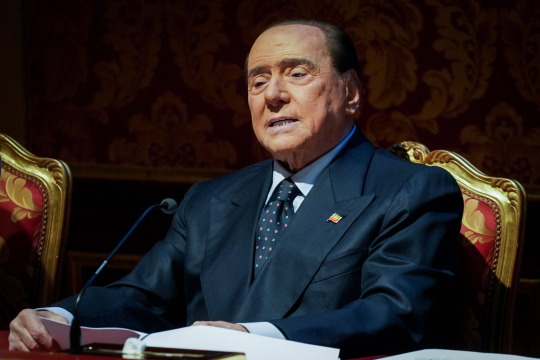
Silvio Berlusconi, who has died aged 86, dominated the public life of his country in a way no Italian had done since the fascist dictator Benito Mussolini. He was the Republic’s longest-serving prime minister. But whereas he was brilliant at winning and holding power, the use he made of it was disastrous. The “Berlusconi decade” – he held power for eight of the years between 2001 and 2011 – will be remembered as a period in which the Italian economy virtually stood still.
Berlusconi’s influence extended far beyond politics and the economy. It can be argued that he gathered to himself more power than was ever wielded by one individual in a western democracy. At the height of his career he was Italy’s richest man, and there was almost no area of Italian life untouched by his influence. His business empire encompassed property and insurance, debt financing and retail interests. He was the chairman of his country’s league-topping football side.
But, above all, he and the members of his immediate family held sway over a media empire whose potential for influence on public opinion had no parallel in Europe. It included three of Italy’s four commercial networks, two large publishing houses, two national newspapers, the country’s largest film production and distribution firm, and 50 periodicals, including one of Italy’s two main weekly news magazines. Since the state-owned RAI’s three TV channels were also answerable to Berlusconi in his role as prime minister, he directly or indirectly influenced 90% of everything that was watched on television in a country where TV enjoyed disproportionate influence because so few people read its newspapers.
The importance Berlusconi attached to images was characteristic of a society that has invariably placed great stress on appearance. Always immaculately dressed, he sported a tan as unchanging as his smile. But, as he aged, it became increasingly difficult for him to project the image he sought, and in 2004 he invited widespread ridicule outside Italy by having first a facelift and then a hair transplant.
Berlusconi’s career can be seen as one long exercise in getting around obstacles that, in a society less tolerant of rule-breaking, would have stopped him long before he reached government. He constructed a national commercial television network in a country where the possibility had been considered illegal. He entered politics despite a breathtaking assortment of conflicting interests. He survived repeated attempts to have him put in jail for offences including the bribing of judges. He was found guilty on several occasions. Some of his convictions were overturned on appeal. But in the remaining cases, he was saved from the consequences of his dishonesty by a statute of limitations.
In a way that was reminiscent of Margaret Thatcher, he cut across class barriers to construct an ample majority for the right. But, unlike his fellow conservative, he was never fully a politician. Indeed, his admirers credited him with pioneering a form of “anti-politics”. Certainly Berlusconi could be rash, tactless and, on occasions, outrageous. In a period of less than two months in 2003, he compared a German MEP with a concentration camp guard, said Italian judges were “mentally disturbed” and appeared to defend Mussolini’s fascist regime. But, in several respects, he was a product of the established political order he appeared to be challenging.
His success was made possible by patronage from one of its most corrupt politicians, Bettino Craxi. He may also have benefited greatly from his membership of the secretive and conspiratorial P2 Masonic lodge. Berlusconi always claimed that his greatest achievement was to save Italy from communism at the 1994 elections. And Italian capitalism was indeed in deep crisis then. The collapse of the Christian Democrats and the socialists left business people without politicians who could oil the wheels of government for them. Of no one was this truer than Berlusconi, whose patron, Craxi, had fled the country.
The only sizeable movement left more or less unscathed by the scandals ravaging the old order was the Party of the Democratic Left (PDS), which had ditched Marxism after the fall of the Berlin Wall. When he “came on to the pitch” (the archetypal example of his astute application of sporting terms to political life), Berlusconi joined a side with almost no players. Yet within just a few months his team had won, and its “captain” had accomplished at least two remarkable feats. One was to show for the first time that a politician with money and a firm grip on the mass media could win power without a traditional party rooted in an ideology. Berlusconi’s own party, Forza Italia (“Come on Italy”) was created by his advertising agency, Publitalia.
His other accomplishment was to mould a “new right” from the ruins of the postwar system. Apart from Forza Italia, it included Umberto Bossi’s regionalist Northern League and Gianfranco Fini’s MSI which, for the sake of political respectability, reinvented itself as a “post-fascist” National Alliance. Berlusconi’s coalition later took in the more conservative of the remaining Christian Democrats.
The man who for the best part of 20 years was the undisputed leader of the Italian right was born in a Milan suburb, the son of Luigi Berlusconi, a bank clerk, and his wife, Rosella (nee Bossi, though not related to Umberto). He provided early evidence of a talent for making money by ghostwriting essays for his fellow secondary school students. He went on to study law at university and paid for his tuition by selling vacuum cleaners, photographing social events and running a band that played on summer cruise ships. Berlusconi was the vocalist. He was particularly fond of Neapolitan love songs and later in life engaged a restaurant guitarist-singer from Naples to play for him and his guests. He and his resident minstrel made several CDs together.
After graduating in 1961, Berlusconi went straight into business, borrowing the money he needed to set up his first company, Edilnord, from the bank where his father worked. It was not long before he was engaged in a huge project, the development of Milano 2, a complex on the eastern outskirts of his home city that included 4,000 flats, a hotel and offices.
One of the enduring mysteries of Berlusconi’s career is how a young and largely untested property developer was able to get together the capital he needed. He himself refused to say. His adversaries suggested it came from the mafia. His supporters hinted that it was the undeclared savings of rich Milanese who would have otherwise stashed it in Swiss banks.
The roots of Berlusconi’s media empire lay in Milano 2 and a cable television station he set up for its residents, Telemilano. Dodging a law that allowed only the RAI to broadcast nationally, Berlusconi wove a network of local stations that simultaneously broadcast the same programmes. By 1984, when his friend Craxi sanctioned the ruse by decree, Berlusconi’s Fininvest holding company owned three channels: Canale 5, Italia 1 and Rete 4. Two years later, he became chairman of Milan football club and under his indulgent stewardship it once again became one of the most triumphant sides in Europe. He sold the club in 2017 and took over Monza in 2018.
Berlusconi’s first experience of politics was less successful. His 1994 government collapsed before the year was out. Its efforts to curb the powers of the prosecutors who were harrying him provoked a national and international outcry. His attempts to reform the pension system prompted a national strike. And his coalition was beset by internal disagreement. After the prime minister was notified that Fininvest was under investigation for bribing tax officials – while he was hosting an international conference on organised crime – Bossi and his MPs defected to the opposition.
There were times over the next seven years in which it seemed highly likely that Berlusconi would never return to high office. But in 2001 he stormed back in a campaign won, not with a manifesto, but a contract and a biography. On a TV chat show, he flamboyantly signed a “contract with the Italian people” that listed his campaign pledges. As he did so, a skilfully crafted account of his life entitled An Italian Story was being delivered, at Berlusconi’s personal expense, to every household in the land.
His second stint as prime minister was the longest of any Italian politician since the second world war (though, because of a reshuffle in 2005, it technically comprised two governments). After decades of short-lived administrations, Berlusconi’s 2001-06 government marked a unique opportunity to relaunch a country whose economy was already stalling. Instead, he used it largely to deal with issues of personal concern.
Laws were passed that obstructed trans-European investigations (such as one launched into Berlusconi’s Spanish dealings), prevented Rete 4 being moved to satellite, undermined the independence of the prosecution service and provided Berlusconi himself with immunity from prosecution (though that one was overturned by the constitutional court). Pension and labour market reforms were enacted. But the government shied away from the other structural reforms Italy’s ailing economy so obviously needed. Towards the end of its life, moreover, it began to lose its grip on the public accounts.
Mounting concern over Berlusconi’s management of the economy and the public finances coincided with growing divisions in his governing majority. The conservative Christian Democrats became increasingly fractious. An election was due the following year, and as it became clear that the right had little chance of hanging on to power, Berlusconi embarked on a project that – more than any other – betrayed his contempt for the nation he claimed to love. He rammed through parliament an electoral law that tipped the odds in favour of the right and, at the same time, ensured the left would have difficulty in governing if it won.
This breathtakingly cynical legislation made it possible for the winning party to have a majority in the lower house, but not in the upper. There, the odds were in favour of parties, such as the Northern League, whose support was regionally concentrated. Even the politician who drafted it called it a porcata (a “load of rubbish”, but also a “dirty trick”).
The 2005 act did away with first-past-the-post rules that had given Italy both a relatively stable, two-party (or rather, two-alliance) system and single-member constituencies whose parliamentary representatives had an interest in responding to the concerns of their voters. Unsurprisingly, the new law opened a gulf between the electors and the elected that helps explain the revolt against traditional politics, and mainstream politicians, later spearheaded by the comedian Beppe Grillo and his Five Star Movement. However, the immediate effect of the new electoral rules was slight. If the centre-left returned to power with only a two-seat majority in the Senate, it had less to do with the unfairness of the law than with Berlusconi’s genius for campaigning.
Throughout his career, he demonstrated an uncanny ability to monopolise the nation’s attention, often using shock tactics for the purpose. He opened the 2006 campaign by comparing himself to Jesus, and closed it by saying he could not believe the left would win because there were not “that many dickheads around”. In the event, he lost by barely 40,000 votes. And in one of the many ways in which Berlusconi prefigured Donald Trump, he refused to acknowledge defeat. It took almost a month to get him to resign.
The coalition under Romano Prodi that replaced Berlusconi’s government was probably doomed to be short-lived. And its members did not help by squabbling incessantly. But among the causes of its demise two years later was the defection of a senator who in 2013 told prosecutors Berlusconi had paid him €3m to do so.
To the renewed astonishment of Italy’s European partners, Berlusconi coasted to victory in the 2008 election.
More than ever before, foreigners asked how Italians could possibly elect as their leader – not once, not twice, but three times – a man widely viewed outside Italy as a buffoon, or worse. His media power and financial resources certainly accounted for a large part of the answer. But they were never the whole of it. Italians have always loved a winner and he was the embodiment of self-made success. He had a 70-room mansion outside Milan, a villa on the Costa Smeralda, a palazzo in Rome and about 20 other homes. In 1990, he had married the actor Veronica Lario (nee Miriam Bartolini), as his second wife. By the time of their wedding, they had already had a son and two daughters. He had also fathered a son and daughter by his first wife, Carla dall’Oglio, from whom he was divorced in 1985.
Berlusconi’s successful career appeared to offer Italians the hope that, with enough effort and intelligence, they too could escape the rigid curbs imposed on them by their society to have it all. His supporters also liked the way his gags and gaffes marked him out from the normal run of career politicians. But then he was a populist of genius. He was the first modern Italian politician to speak to voters in the language of the streets. Never one to shrink from oversimplifying an issue, he also knew how to push the emotional buttons that would get a response from his compatriots.
He was particularly adept at depicting politics in terms of the family. A scholarly analysis of his speeches concluded he adopted the role of the mamma: endlessly complaining about the sacrifices he made on behalf of his “children”, the electorate, to justify a possessive claim on their loyalty and affection in the form of votes. Perhaps most decisive, though, was Berlusconi’s shameless readiness to appeal to the voters’ basest, most anti-social instincts. His “dickheads” remark was one of many in which Berlusconi sent a coded message to Italians that, if they put him into office, he would not tax them too heavily and would take an indulgent approach to evasion. After 2008, however, the state of Italy’s public accounts, and the obligations imposed on it by membership of the euro, forced him to be more responsible. Nor was that the only promising thing about his fourth government.
Berlusconi had always claimed he had been prevented from carrying out a liberal revolution in Italy because of the obstruction of his allies, particularly the conservative Christian Democrats. But they had split from him in 2006, and the following year Berlusconi embarked on a campaign to forge a united Italian right. In the end, he succeeded only in merging his own party with the National Alliance. But the resulting movement, which he called the Freedom People (PdL), was the nearest thing modern Italy had seen to a mass conservative movement.
By the time of its inaugural congress in March 2009 even some of his most unyielding critics were admitting that he seemed to have learned something from the failure of his earlier governments. Some of his ministers were attempting genuine reforms: imposing changes on Italy’s sclerotic civil service and its hidebound, gerontocratic university system. Then, entirely because of Berlusconi, it all went horribly wrong.
It had long been clear that his marriage was in trouble. As far back as 2002, he had astonished a press conference by commenting on the good looks of his guest, the then Danish prime minister, Anders Fogh Rasmussen, and suggesting he might be of interest to Lario.
In 2007, she demanded a public apology after he openly flirted with Mara Carfagna, a former showgirl and glamour model who had been elected to parliament for his party. He gave the apology, but the following year in a move that left feminists open-mouthed he made Carfagna equal opportunities minister. The scandal over her appointment was to pale into insignificance, however, in comparison with what was to come. One theory was that it had to do with the death of Berlusconi’s beloved mother, Rosa, in 2008. She, it was said, had held him back from some of his greater follies and without her restraining influence he lost all sense of proportion and discretion.
The first sign of trouble came, once again, from Lario when she denounced as “shamelessly tacky” a scheme to put up a bevy of showgirls as PdL candidates for the European parliament. Days later, she announced through leaks to the press that she was seeking a divorce and accused her husband of “consorting with minors”. Her accusation brought to light Berlusconi’s never fully explained relationship with a Neapolitan teenager, Noemi Letizia. From then on, it was one sex scandal after another as the public learned of goings-on in the prime minister’s homes reminiscent of the later Roman empire.
First, there were claims that he had used his official plane to fly young women to his estate on the Costa Smeralda. Then came evidence of sex workers mingling with actresses and dancers at dinner parties in his Roman home (one even recorded her pillow talk with the prime minister, which was then put on the internet). But nothing was to be as damaging for Berlusconi as the investigation – and subsequent trial – centring on his relationship with a young Moroccan runaway, Karima el-Mahroug, who was 17 at the time she attended so-called “bunga bunga” parties at his mansion near Milan.
The sex scandals coincided with an accumulation of political and economic storm clouds. Impatient with Berlusconi’s undemocratic management of the PdL, his long-standing ally Fini called unsuccessfully for change before he was ejected, along with a small group of followers in late 2010. Their departure left Berlusconi with a wafer-thin majority, just as his government began to suffer the effects of the global economic crisis. His reaction to the US credit crunch of 2008 had been to insist it would not affect Italy. But the following year the economy shrank by 5.5%, and as 2010 progressed a growing number of Berlusconi’s compatriots began to realise they had been tricked. With the crisis spreading into the eurozone the following year, Berlusconi, his popularity ratings diving, repeatedly tried to avoid implementing the austerity measures demanded of him by the European institutions. Italy’s borrowing costs soared and his supporters grew increasingly restive.
By November 2011, no longer able to command a majority in the lower house of parliament, Berlusconi stepped down to make way for a non-party government headed by the former EU commissioner Mario Monti. Again, it seemed as if his political career was over. But that was to reckon without Berlusconi’s formidable resources and his vested interest in staying in politics, both as a way of keeping out of jail and safeguarding his companies. The following December, after watching as support drained from the PdL, Berlusconi snatched back the leadership, brought down the Monti government and forced an early election.
He did not lead the PdL back to government at the 2013 general election. But by reviving its partnership with the Northern League and promising to restore the proceeds of a much loathed tax on first homes, he saved it from eclipse. His rightwing alliance took enough seats to guarantee it an important role in the bargaining that followed. It ended in a left-right coalition headed by Enrico Letta. Once again, Berlusconi had made himself the arbiter of the Italian government’s fortunes. Or so he thought.
In the summer of 2013, Berlusconi’s legal difficulties turned from an irritant into a nightmare. In June, in a case brought against him because of his involvement with El-Mahroug, he was convicted of paying a juvenile sex worker and then misusing his official position to try to cover up their relationship. He was later acquitted of both charges on appeal.
But in August, his conviction in a less publicised trial involving his group’s trading activities was upheld. Berlusconi was sentenced to four years in jail for tax fraud. Partly because of an earlier amnesty, and partly because he was a first offender, he did not go to prison. But he did have to do community service in a home for elderly people.
Apparently furious with Letta for failing to protect him from the courts, Berlusconi tried to destroy him, as he had Monti. But his party’s ministers in the coalition refused to follow his orders and formed a new party, led by Berlusconi’s erstwhile heir apparent, Angelino Alfano. The rift highlighted the tycoon turned politician’s refusal to choose a political heir. Various successors were proclaimed, but each time Berlusconi’s giant ego got in the way.
Paradoxically, his warmest approval was reserved for an emerging rival: Matteo Renzi, of the centre-left Democratic party, who in early 2014 snatched power from Letta. Soon after, Renzi hatched a deal that pandered to the former prime minister’s vanity: Berlusconi would back the young leader’s ambitious programme of constitutional reform and thereby salvage his tattered reputation. He would emerge from the process as the godparent of a new Italy.
It was not to be. Renzi dumped him before the constitutional reform entered the decisive phase of its passage through parliament – a fateful decision because, without the support of Berlusconi’s party, which had reverted to its old name of Forza Italia, Renzi had to submit his proposals to a referendum, which he lost. By then, however, Berlusconi cut an increasingly baleful figure: the leader of a much-diminished party, surrounded by – critics said, hostage to – a coterie of hangers-on that included his new partner, Francesca Pascale, almost half a century his junior. As the results came in, showing Forza Italia struggling to get into double figures, Berlusconi suffered heart failure and later underwent surgery. It looked as if the curtain had finally come down on the longest running act in the variety show of European politics.
But that was to underestimate the man. Over the months that followed, Berlusconi moulded a new image for himself, as a soft-hearted grandfather – animal-loving and vegetarian, like his partner.
Forza Italia failed to gain any leverage at the 2018 general election, which ushered in a new kind of populism: that of the maverick Five Star Movement. Grillo’s followers were the senior partners in both the coalitions led by Giuseppe Conte that governed Italy until 2021. But Berlusconi’s party returned to power that year as part of a broadly based alliance in support of Conte’s successor, the former European Central Bank president, Mario Draghi.
Less than a year and half later, Berlusconi played a key role in bringing Draghi down. By then, the octogenarian TV tycoon had another improbably young partner, Pascale having left him and formed a partnership with another woman. Berlusconi’s new companion was Marta Fascina, a Forza Italia deputy just 33 years old at the time. Together, they hosted a lunch at one of the former prime minister’s many luxurious residences that sealed Draghi’s fate. Also at the table were Bossi’s successor as head of the League, Matteo Salvini, and Giorgia Meloni, the leader of the Brothers of Italy, a party with roots in neo-fascism that had been steadily eating into the League’s support.
At the general election that followed in 2022, their conservative alliance won an outright majority. But it was Meloni’s party that emerged with the largest number of votes and seats, and the right to take the prime ministership. Though she was significantly more reactionary than Berlusconi on many issues, Meloni, 40 years younger, had a very different conception of the role of women. Indeed, she once publicly criticised his “bunga bunga” parties.
It is profoundly ironic that with his last decisive political intervention, Berlusconi, the very embodiment of condescendingly patriarchal and sexist attitudes towards women, should have opened the way for Italy to acquire not only its first female prime minister, but one whom he found intolerably bossy.
Election to the European parliament in 2019 led to little after his health was affected by Covid-19. When he went into hospital with a lung infection in April he was found to have leukaemia.
He is survived by Marta and his children, Marina, Pier Silvio, Barbara, Eleonora and Luigi.
🔔 Silvio Berlusconi, businessman and politician, born 29 September 1936; died 12 June 2023
Daily inspiration. Discover more photos at http://justforbooks.tumblr.com
19 notes
·
View notes
Text
Like, it’s a common fanon and it shows up in fanfic all the time that the Wizarding World has a lot of prejudice against muggleborns even outside the hardline purist voldie-side. And there’s some indication that even the OotP-types aren’t all that fond of muggles, but there’s actually not a lot of evidence that there is, outside of the Death Eaters and those aligned with them, that blood purity actually matters to many people, or that Anti-Muggleborn prejudice is a major problem beyond the aforementioned DE-types.
And the fact is, the very existence of the Death Eaters belies the idea that anti-muggleborn prejudice is widespread.
I mean, we know J.K.Rowling didn’t actually think that far into it because she’s never thought a deep thought in her life and her worldbuilding is as shallow as a puddle, but taking the universe on the face of it:
Fascism almost always gains power because it is given the keys to power by some segment of the conventional conservative elite. In almost every case, because that same conventional conservative elite is afraid of losing power if they don’t bring the fascists onboard. There’s a reason fascism won in places like Italy and Germany, and not in France or England. Many, actually, but one of the key ones is that England and France were not facing remotely the same sort of perceived leftist threat that the Weimar Republic was, or that Italy was when Mussolini did his thing.
If the conventional conservative elites don’t feel threatened, then they’re not going to give power to the fascists to turn them into a weapon, because they don’t need the help, they’re not desperate enough to use that ‘break glass’ option.
If Baldywarts is supposed to be an analogue (very badly presented, because again, JKR is bad at worldbuilding with any depth) for Hitler, then the old Sacred 28 pureblood families like Lucius Malfoy and his dad Abraxus, the Notts, etc are the conventional conservative elite.
So on the face of it, these old families wouldn’t have wanted to bring a vulgarian half-blood like Tom Riddle into power in the first place if they weren’t, on some level, afraid of losing their position and power. Which can only mean they certainly weren’t lording it over the Muggleborns and the half-bloods, etc, when Voldemort first rose to power. Indeed, the books, from the moment anti-Muggleborn prejudice is introduced, present it as a minority position, one that most of wizarding society doesn’t support.
Old families may have influence by virtue of wealth (see Lucius Malfoy being Fudge’s guest at the World Cup) but that is not a clear indication of any significant legal or social disadvantages roadblocking muggleborns. At most, some individual prejudice or some snide comments, which is about all we get directed at muggleborns who aren’t part of the Virulently Murderous Crowd that surrounds Moldyshorts.
Given that, and given the fears of losing power or status that the conservative elite would have to have to be willing to give someone like Riddle Me Voldie power...
It’s honestly not that unlikely that, with the influence of Tommy Jokes and the Death Snackers and their ilk from positions of power (which by all evidence appears to be what happens after the Second Wizarding War, to a great extent), anti-muggleborn prejudice would have no significant hold over the halls of power or society at large, at least not to the sort of extent that fanfics and fanon often want to claim.
I mean, wizarding society, bar Moldy, is widespreadly racist, against goblins, centaurs, giants, house elves, et cetera, yes, but there’s not a lot of evidence of any widespread hatred of Muggleborns from other quarters.
And it doesn’t make sense for there to have been, or the pureblood elite families would have had no reason to align themselves with, as I said, a half-blood vulgarian like Lard Puddlemort.
#Musings#Harry Potter#Harry Potter (Series)#Lord Voldemort#Tom Riddle#Fascism#History#Anti-J.K. Rowling#Anti-JKR#Ultimately I 100% guarantee she never thought that deep#because the woman is remarkably intellectually incurious and so no doubt knew very little about the realities of how Hitler came to power#and Voldemort is a terrible hitler analogue because Voldemort seizes power by force and Hitler very much does not he gets handed power#Lenin is actually a better analogue for Voldemort in terms of his methods even if not in his ideas
9 notes
·
View notes
Text
There’s some shit going down in the yugituber community right now and it made me wanna point something out that a lot of leftists don’t really understand, even if they can recite the theory of it.
The left and the right recruit from the same pool of people. And those people are disenfranchised and marginalised people.
Most people under capitalism are marginalised, because capitalism relies on economic disparity to function and as such poverty is actively marginalised.
This creates a massive and ever increasing pool of disenfranchised people ready to be radicalised into either direction, splitting society and creating conditions for the rise of fascism over and over again.
This is part of how capitalism sustains itself.
This means that the people who are radicalised towards the right are not fundamentally different from those who are radicalised to the left. The main difference is which kind of ideology they are exposed to and how they were raised.
Marginalisation on other axes affects this, too, of course, so people who are marginalised on axes of gender, sexuality, race, disability, ect skew more left while more axes of privilege make right wing ideology easier to accept.
Right wing marginalisation sells you an idea of your privilege entitling you to something better than what capitalism is willing and able to give you and scapegoats other marginalised people as the guilty party.
It lives off of dividing the economically disparaged.
You are under no obligation to involve yourself with people on the right. But if leftism can not approach these people at the common point we both experience, being failed by capitalism and marginalised for it, leftism has failed. It’s part of the capitalism -> fascism -> capitalism cycle that leftism has to separate itself by default on a basis of ideological purity from the people who are being targeted by the right, so that the liberal center and the far right can crush growing leftism with every repitition of the cycle.
A part of leftism needs to be to have compassion and understanding towards the right, even when we have to draw a hard line in the sand towards them at the same time.
Part of the balance act is to understand the nazi as a human person who has been indoctrinated with fascism and who is fundamentally no different from us, possibly less lucky, while still being able to throw them out of the bar, knowing if we don’t, it’ll become a nazi bar.
To be able to draw that kind of line a lot of leftists disregard the importance of understanding and compassion towards the right. and by doing that we become a tool in their rise to power.
We judge the past of people, rather than engaging with the present, we create strict moral codes, we push for no tolerance, no nuance positions on anything we can fight, we long for a yes or no rule set and we seek to outcast and punish without a moments hesitation.
We are afraid to acknowledge the inherent mess of humanity and ethics and we suffer because of it.
We make leftism inhospitable to anyone but people seeking positions of power to kick down from and those who believe strongly enough in leftism to be leftists in spite of how leftist spaces operate.
To live in a panopticon of our own creation does not make for political insight, and it especially doesn’t make for human understanding.
And it has always happened.
There is a reason leftist infighting is a meme older than fire.
During fascism’s rise to power in italy and germany we neglected the fight against them because we couldn’t stop arguing amongst our own. In a lot of ways anarchists and ml’s hate each other more than they hate fascists. Add soc-dem’s to the mix and boy does it not get better.
At the time leftists in germany watching the rise of Hitler have commonly said “What’s that gonna change? We’re already under crypto fascism, going mask off doesn’t matter.”
But it did. And it was more important for the left here to remain ideologically pure to their own metrics than fight the rise of fascism until it was too late.
I live in western germany.
There is a lot of worry here about how the ever present crypto fascist party, the AfD, is incredibly popular in the east.
And the way we talk about them is incredibly void of compassion, pretty much just attributing it to easterners being stupid and gullible.
Meanwhile the east has spent decades under the control of the soviet union, failed by a system that calls itself communism.
When germany was reunited, it wasn’t so much a reunification as an annexation.
We didn’t form one new country, everything in the east was bought up immediately by investors and landlords in the west and other western countries.
As a result, not much changed.
Now fascists come along and point at how both the glorious left and the enlightened liberal center have failed them and we, here in the west, have the audacity to laugh at them and call them stupid for falling for it.
16 notes
·
View notes
Text
NEW INVINCIBLE OC

(Picrew as a placeholder until I can get a good photo of him)
Introducing Kyle Washington a.k.a Frontline!
Kyle was born on the 17th of March 1919, the youngest child of a small farming family in Fulton County, Kentucky. The child of two immigrants, Kyle has been said to be the perfect mix of his parents, with the confidence and wit of his Irish father and the kindness and patience of his German mother. Despite growing up in a house of little social standing, Kyle always maintained big dreams and went the extra mile in his studies. This eventually paid off when a visiting professor saw the incredible aptitude he had for mathematics, and this resulted in a miraculous scholarship to the illustrious University of Kentucky in Lexington.
While never expecting the opportunity given to him, Kyle did all he could to advance in his classes, making the Dean’s List several times across his engineering degree before graduating at the top of his class in July of 1941. It was also here that he made several left-wing friends, who did much to influence his moral worldview and encourage his desire to benefit others with his qualifications, which became his primary goal upon graduation.
That was until the Second World War came around.
Being of age and sufficient health, Kyle was soon drafted into officer training, commissioning as a Second Lieutenant in April 1942. While awaiting his orders to ship to Fascist Italy, Kyle was approached by a ‘Colonel Ross Lake’, later discovered to be none other than The Immortal, who recommended he take part in a clandestine experiment: the experiment caused a radical physical transformation in Washington, turning an able-bodied farm boy into a goliath of a man endowed with superpowers. He saw his first combat in January of 1943 with the landings at Anzio Beach, not as part of a regular military unit, but as part of the world’s first superhero team: The Defenders of the Free World. Alongside legends like The Immortal and War Woman as well as other newcomers like Soprano and the original Red Rush, they fought from Italy’s blood-soaked beaches to Germany’s ruined cities, fighting soldiers and supervillains alike. Post-war, these five would also form the first iteration of the Guardians of the Globe in May 1947.
From here, Kyle, now in his hero alias of Frontline, went on to lead an illustrious 48 year long career as a professional superhero, doing everything from fighting several alien invasions to leading the first ever version of the juvenile Teen Team, which included future Guardians Green Ghost, the second Red Rush and Black Samson. Eventually, Frontline mysteriously vanished while on a mission in late 1994. He was presumed dead for almost 28 years, until a mission by Capes Inc. unearthed him imprisoned in a secret compound in the Himalayas. After a short recovery period, Frontline returned to active duty, more eager than ever to pursue justice worldwide.
Powers/Abilities:
Super Strength- Frontline’s strength is by far his most well-known attribute, simply because he is unequalled by any other human, to the point he is frequently known as ‘The Strongest Man on Earth’. In fact, his level of strength puts him above most fully matured Viltrumites, making him one of the most viable contenders against a future Viltrumite invasion.
Superhuman Durability- Frontline’s cells were made astronomically denser by the experiment that gave him his powers. He has survived gunshots, attacks from blunt and sharp weapons, electricity, both extreme heat and extreme cold, explosions, radiation, acids, and even extreme gravitational force. This ability is so strong that it borders on nigh-invulnerability.
Superhuman Stamina- Frontline’s cells are also able to respirate much faster with much less oxygen than most humans, allowing him to perform for hours on end without any visible signs of tiring.
Slowed Aging/Immortality- Frontline ages at a vastly slower rate than other humans. Despite being 103 years old at the time of writing, he maintains the appearance of a man in his late forties to early fifties.
Danger Sense- This ability is by far Frontline’s most unique superpower: his body emits a low-level extrasensory field with an estimated radius of around 25-30 meters wide, functioning as a sort of ‘sixth sense’, that allows him to remain aware of any other living beings nearby. This field is subject to the laws of physics, unable to penetrate solid surfaces. The main purpose of this field is to alert him to any imminent dangers that he would otherwise remain unaware of, making it nigh impossible to ambush him in any situation.
Master Combatant- Seasoned by decades of action and hundreds of hours of training, Frontline is one of the world’s most accomplished hand-to-hand fighters, employing a mix of American Boxing, Krav Maga, Pro Wrestling, Judo, Taekwondo, Karate, Muay Thai, Capoeira and Brazilian Jiu-Jitsu.
Leadership/Tactician- Frontline has military training and as a result knows how to effectively co-ordinate a group of heroes in the heat of battle.
Multilingual- Frontline is fluent in English, German, French, Spanish, Italian, Russian and Portuguese. He is also proficient in Japanese, Arabic, Tagalog, Mandarin, Polish, Hindu, Turkish and Greek.
Equipment:
Enchanted Amazonian Shield- A gift from fellow hero War Woman, the shield that serves as Frontline’s main weapon is forged from the same material as her mace, making it nigh indestructible. It is also magically bound to him and will return to his hand with a physical cue to do so (most commonly him holding out his hand).
Super Suit: The latest of Frontline’s superhero attire is an update of one of the first designs created by renowned superhero tailor Art Rosenbaum in November 1981, designed to keep up with much of the damage that previous costumes could not. A complicated mix of spandex, Kevlar and even a non-Newtonian fluid that remains classified, the suit has withstood attacks from firearms to superhuman opponents, and even withstood the now-legendary brawl between Frontline and the mythical Ancient Greek hero Herakles. Most early iterations of his uniform had a detachable helmet or built-in cowl for him to conceal his identity, but the updated version he wears in the modern day does not, with him reasoning ‘I’m dead anyway, who’s gonna know me?’
Amazonian Dagger: Another gift from the Amazons, this eagle-headed dagger is also forged from the same material as Washington’s shield, also making it nigh indestructible. It also is strong enough to cut through Frontline’s unnaturally strong facial hair, and therefore sees more use as an implement for shaving than as a weapon.
Personality:
Kyle is a very old man, and it shows in how he interacts with others, as he acts much like you would expect your favourite grandparent to. Underneath this relaxed and affable exterior, however, lies the forceful and unwavering personality of someone who has been fighting for the past sixty or so years of his life, something that has been there since his youth. He can also be quite protective of those in his care, acting as a father figure to many heroes over his career.
Description:
Standing at 6’3 (1.9m) and weighing in at a staggering 260lbs (118kg), Frontline’s stature matches his larger than life public persona. He has golden blonde hair that is marked by wisps of grey in his old age, and his eyes are a cool earthy brown. His hair used to be slicked back with gel, but since his return has remained in a fairly long side-parted curtain (think Jensen Ackles as Soldier Boy). He also grows a full beard now that he no longer a wears a helmet, which still remain fairly thin, not going past the bottom of his chin.
Inspirations:
Captain America/Steve Rogers

As you’ve probably already guessed, the main inspiration behind Frontline is none other than Captain America himself. Much of what makes Kyle who he is, from growing up poor to his debut in WW2, is taken directly from Steve Rogers’ character.
Superman/Clark Kent
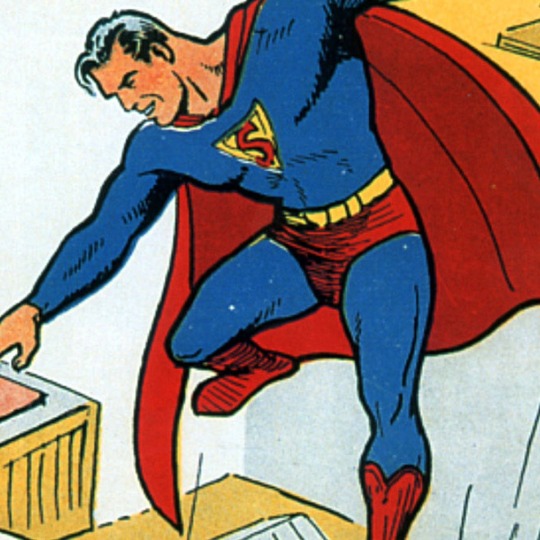
Another big inspiration behind Kyle is DC’s Man of Tomorrow. From his background as a rural farm boy to his intense desire to use his powers for the benefit of others.
My aims with this character is to explore a facet of superhero comics that has always fascinated me: the history of the larger superhero community, as well as looking at how the rise of the superhero has affected the world of Invincible on a much grander scale.
#invincible#invincible show#invincible amazon#invincible oc#🦅🛡#kyle washington#finally made one for the old man#gonna make a master post for all my OCs soon so you guys can look at then more easily
8 notes
·
View notes
Text
Guillermo del Toro's Pinocchio (2022)

Accuracy 4/10
its a very different story but i think it has enough of the same characters and events to be called accurate, I quite like some of the ways characters are used in different ways, instead of the fairy there are 2 blue angels inspired by biblical descriptions of angels, they are beings of life and death, talking about death Pinocchio dies a lot in this film, a bit like how in the book he was originally planned to die in chapter 15. The black rabbits are like grim reapers. The fox and the cat are replaced with a man called Volpe who is fairly similiar to his original character, and Spazzatura who is completely different to the cat, she is an abused monkey who helps Pinocchio, I love Spazzatura.

Quality 10/10The best Pinocchio adaptation by far, first of all stop motion is just a beautiful art form and this is no exception. The film itself has good humour especially from the cricket but also does more serious moments really well and can get really dark but in a more complex way than the orignal book, in the book characters just get basically tortured whereas this adaption is a more tragic story, its based in fascist italy and this works really well for the story, in the original book the lesson is that obedience is good but in this film its shown that extreme obedience like in Pinocchio and also Fascist Italy is definitely a bad thing. Instead of turning them into donkeys they turn children into obedient soldiers which i think is a really clever use of the original story. Just like in Disney's Pinocchio of the same year this adaptation added the plot point of Gepetto having a dead son, in the Disney movie this isn't really developed on but in this film its really important, at the start Gepetto hates that he has this annoying puppet instead of his son, this isn't what he wanted, he wanted his son back and Pinocchio is not even close to a replacement but by the end of the film he learns to love Pinocchio and that is the lesson, he doesn't even turn into a real boy because thats not necessary, he just becomes a better person.
#pinocchio#film review#guillermo de toro#ewan mcgregor#cate blanchett#fascist italy#biblically accurate angel#dead son#mussolini
3 notes
·
View notes
Text
Sometimes the internet is beautiful.
Like many others, trying to find information on what happened during World War 2 is a daunting task, especially when this happened in a different country. With also limited time (and money!) to visit different countries, and with a language barrier too, the internet becomes the main resource available to any would-be family researcher.
Whilst it is often bullshit (no Amazon, I don't want to "buy" a fascist internment camp thanks), the resources, if you look hard for them, are amazing.
I needed to use a VPN to link to Italian servers so that results would be more relevant (rather than searching 100's of pages from a UK based IP address). Google translate also helps a great deal as my Italian is limited to hello, please, thank you and different pasta types (sorry Italy).
My searches found this Italian project which is digitising all documents they can discover during the Italian fascist regime:
The Italian fascist state made use of various instruments and places to imprison, segregate and deport foreign populations, political opponents, Jews, homosexuals and Roma.
The documents I have found so far are very interesting. I haven't been through all scanned documents as yet, but it feels like a step in the right direction, getting me closer to locating where my grandfather may have been held during the second world war.
From concentration camps for Slovenian and Croatian civilians, to those where thousands of Eritreans, Ethiopians and Libyans were deported, from places of internment for foreign Jews, to places of confinement for political opponents.
This is just one of several resources I am researching to try and find where he was held, and for how long. We may never know why he was in Italy in the first place, but I will endeavour to find out.
2 notes
·
View notes
Text
Statement of Purpose? My political lines? My don’t doxx me e-plea?
I think what really interests me now is application, ok-I’m convinced of most of the radical feminist analysis but how do we marry that to the left? How do we force left wing parties to accept our program and/or be effective on our own?
Because of the stigmatization of “radical feminism” in left spaces this blog is mostly anonymous unfortunately. Tumblr has always been a space where I feel I can be most myself so you will definitely see personal, aesthetic and historical content but the meat of this blog is a theoretical and historical exploration of how to get women’s issues on the docket. If we even can.
About me:
I am a Marxist Feminist with two degrees in American history a BA and an MA. I am also a lesbian. I was radicalized into feminism at age 20 after hearing a lecture on “queering ecosocialism” after receiving news that a former gay acquaintance had recently passed from drug addiction and sex work. The dichotomy between true lived gay and lesbian life experiences and the use of “queer” as a political and literary device made me sick, sad and angry and I took to the internet and found that there were a good deal of lesbians who felt the same way.
While I studied American history, I’m not an academic and this work is not peer reviewed. I will do my best to be transparent about my source material and get access to scholarly sources when I can so that you have the most knowledge to make an informed decision about my writing. I welcome substantive feedback, particularly since I have not been trained in political theory, economics or philosophy even though I read widely. Unfortunately, writing about gender and feminism in the candid way I want is difficult in the academy right now for both financial and political reasons. Some people can learn to handle mass harassment but, I am but a rat, I try to avoid it where I can. Getting mass harassment on a poverty salary is a type of vulnerability I’m not really willing to take on.
While Marxism isn’t the only lens I view politics from, it’s a really important one to disclose. I am not affiliated with the Democratic party outside of generally supporting everyone to vote fascists out of office but even then, I think fascism will be rooted out through the education and uplift of the people generally, not through Democratic party politics.
This means that I focus on building grassroots power through unions and collectives over voting for specific candidates and I believe that the very structure of US society will continue to negatively impact regular working people no matter what party is in power. The only solution is the broad restricting of our economy and society which regular people can accomplish by coming together and solving problems in their community and within our country and world. I draw upon a robust historical tradition of trade unionism in the United States and in my home countries if Italy and The Republic of Ireland (so yes, I am whiter than snow ahaha).
Many radical feminists have a left liberal framework, I aim to spend a good deal of time writing about how many radical feminists were socialists affiliated with Mao and expelling some myths that both the Sexist Marxist Left and the Liberal American Feminist Left. I do this with the intent of creating a cohesive left wing vision that offers liberation for all under one banner-my intent is not to fold women into a male dominated left. Anti-Imperialism and Anti Racism is an equally important struggle and it’s one I engage in through a vigorous anti imperialist and anti fascist line but I do not speak from experience. Given the current culture on the far left, I do not engage with individuals whose only claim to argumentative superiority is identity based, you have to tell me why your ideas and perspective is better, life experience and feelings count.
Given that I’m white and catholic and grew up in a rural area. Racial issues can be a blind spot for me, I’ve done a great deal of academic and personal work to remediate this from studying the African Diaspora and Indigenous American culture, philosophy and statecraft in the Caribbean, Brazil, Quebec/New York and the Pacific Northwest to living, working and learning from people of color with vastly different life experiences from me. I’m happy to accept feedback and to promote feminists of color even if we have theoretical disagreements because I recognize that the personal experience of the colonized individual is a distinctly valuable resource in crafting strategies to destroy it but I do not believe there is a singular “woc perspective” and am very sharply critical of liberals who prioritize anti racism in the United States over imperial struggle abroad.
What I do not partake in is abusive cancellation campaigns. While there are a lot of bad actors in all types of politics I don’t think harassment is an effective strategy to encourage good behavior. I believe in good faith engagement and good emotional boundaries. If the content on this blog upsets you you’re 100% free to write a post detailing why you think that and offering improvements and solutions but I will block you if you harass me, call me a fascist without evidence or mischaracterize me. I have enabled abusers and abusive behavior under the guise of idpol in the past but will no longer.
1 note
·
View note
Text
Proper-wing Meloni sworn in as Italys first lady prime minister By Reuters
3/3
© Reuters. Italy’s newly elected Prime Minister Giorgia Meloni reacts through the swearing-in ceremony on the Quirinale Presidential Palace, in Rome, Italy October 22, 2022. REUTERS/Guglielmo Mangiapane
2/3
By Crispian Balmer and Angelo Amante
ROME (Reuters) -Giorgia Meloni was sworn in as Italy’s first lady prime minister on Saturday alongside her cupboard workforce, giving the nation its most right-wing authorities since World Warfare Two.
She takes workplace at an particularly fraught second, with Italy’s debt-laden economic system as soon as once more heading into recession, companies buckling beneath the load of hovering vitality payments, and splits inside her coalition over the conflict in Ukraine.
Standing beneath the crystal chandeliers of a frescoed chamber within the presidential palace, Meloni took her oath of workplace as her 6-year-old daughter seemed on.
Head of the nationalist Brothers of Italy, Meloni swept to victory in an election final month as a part of a coalition that included Forza Italia, led by former Prime Minister Silvio Berlusconi, and Matteo Salvini’s anti-immigrant League.
Her authorities, the twelfth this century, replaces a nationwide unity administration piloted by former European Central Financial institution chief Mario Draghi, who was on the forefront of European Union efforts to sanction Russia after it invaded Ukraine in February.
Whereas Meloni has pledged assist for Ukraine, Berlusconi has repeatedly undercut her, earlier this week blaming Kyiv for the conflict and revealing he had exchanged items and “candy letters” together with his outdated buddy, Russian President Vladimir Putin.
After days of usually tense talks, Meloni unveiled her workforce on Friday, giving 5 ministries every to the League and Forza Italia and reserving 9 cupboard posts for her personal get together.
Technocrats make up the remainder of the 24-strong squad, which incorporates simply six girls and the place the common age is 60.
Italy’s perennially weak economic system and ballooning nationwide debt have been entrusted to Giancarlo Giorgetti, seen as a reasonable member of the League. The Overseas Ministry was handed to Forza Italia veteran Antonio Tajani, seen as a pro-European dove.
Tajani informed an area tv channel his first act can be to name his Ukrainian counterpart to guarantee him of Italy’s continued solidarity.
‘PATRIOTS COMING TO POWER’
Meloni’s get together has neo-fascist roots, however she sought to undertaking a reasonable picture through the election marketing campaign, dropping earlier anti-EU rhetoric and pledging to maintain Italy on the coronary heart of European and Western establishments.
European Fee leaders in Brussels despatched her messages of congratulations on Saturday.
“I rely on and sit up for constructive cooperation with the brand new authorities on the challenges we face collectively,” Fee President Ursula von der Leyen wrote on Twitter.
Meloni additionally acquired plaudits from Europe’s nationalist conservatives, who hope her authorities will show a robust ally of their common battles with Brussels.
“Congratulations Giorgia Meloni on the formation of your authorities! Massive day for the European Proper!” Hungarian Prime Minister Viktor Orban wrote on Twitter.
French far-right chief Marine Le Pen tweeted: “Throughout Europe, patriots are coming to energy.”
Meloni is because of maintain her first cupboard assembly on Sunday following a proper handover of energy with Draghi.
She’s going to then will face compulsory confidence votes in parliament through the week that she is going to simply win given her comfy majority.
Originally published at Irvine News HQ
0 notes
Text
1920s Ezio story idea
I don't have an illustration yet but I guess that nobody gives a fuck anyway.
So 1920s Ezio idea!
Florence, 1923. Kingdom of Italy went through numerous tribulations between the unification and WWI, the liberal state failed its citizens, and in October 1922 National Fascist Party (PNF) took over the country. The king appointed Mussolini as the prime minister of Italy. Many people support the new leader and hope that he will lead the barely unified country to a glorious future. During those troublesome times, a young Liceo Classico student, Ezio Auditore, tries to navigate his journey towards adulthood. It is a difficult task due to his family situation. His father Giovanni died fighting in WWI. The same conflict left his older brother Federico disabled. Because of the war, Federico never had a chance to finish school, and now he's unable to work. Auditores barely survive thanks to Maria's hard work and the help of Giovanni's old friend - Lorenzo. The whole family is very proud of Ezio for getting to Liceo Classico. This kind of school is the only secondary school from which one could attend any kind of Italian university courses. Ezio's mother and siblings believe that after he graduates and gets a degree, he'll be able to care for whole family, just like Giovanni did.
Ezio is fully aware of the whole situation, but he cannot help but yearn for some freedom from his responsibilities. He's so busy studying that he barely even notices what's going around him. It's not only studying that's on his mind. He's also crushing on his beautiful classmate - Cristina Vespucci. However, he's not the only one desiring Cristina's attention, so is Vieri de Pazzi a huge supporter of Mussolini, a classmate, and a member of Camicie Nere.
Ezio doesn't like Vieri, but he's doesn't have much of an oppinin about PNF and their supporters. After all, his sister is dating Duccio de Luca, one of the Blackshirts. He trusts his sister's judgment.
One day after a semi-successful attempt to get Cristina's attention, Ezio's best friend Leonardo informs him that he and Cristina belong to the same book club that meets after school and, if Ezio wants to get closer to Cristina, then he should drop by. That's precisely what he does.
It turns out that the 'Book Club' is way more sinister than Ezio anticipated. Peiple there meet to read and discuss books forbidden by the new government. There are not only socialists there, but also communists, republicans, Catholics - the whole shebang!
Ezio starts exploring philosophies and ideas he hadn't thought about and starts questioning everything he was taught at school so far. During their studies, he and Cristina fall in love. Cristina rejects Vieri, and she and Ezio become a couple.
Meanwhile, the persecution in Italy is increasing. Camicie Nere is getting more and more violent and the list of forbidden ideas and ideologies is getting longer than ever. Claudia and Duccio fight a lot. He's getting violent and his ideas more radical than ever. Claudia doesn't like how her love changed.
Ezio gets more engrossed in the Book Club, and it afftects his grades and relationships with his family. One day when Ezio's at school, Federico (against his better judgment) decides to discover what is keeping his brother away from his studies, so he goes through his belongings. He discovers the stack of forbidden books. After Ezio arrivés back from school, Federico confronts him about the discovery. Ezio is disappointed but tells his brother about the Book Club, what he has learned, and about Cristina. Federico is understanding but furious with his younger brother. Ezio's Book Club can jeopardize the future of the whole family. If Ezio gets caught he'd be expelled from school or worse.
Ezio gets angry and the next day in school he's unfocused. Leonardo passes him a note with the next Book Club meeting location. Leonardo can't attend this meeting and bring Ezio to the location so he wrote it down for him. Unfortunately due to nerves, Ezio accidentally loses it. Vieri finds the note and get's suspicious. There are stories about a secret association in school but it's pretty impossible to catch the participants red-handed because they're meeting irregularly in different places. The note is proof of a meeting but Vieri can't be sure that it's the club meeting.
Meanwhile, Duccio is leaving the Auditore household after Claudia broke up with him. While leaving he takes notice of the books in Ezio's room and gets suspicious. He goes to the Blackshirts meeting. At the meeting he and Vieri bond over the hatred toward the Auditore family. Vieri says that he has heard about a secret association in school that indulges in illegal activity and he suspects that Ezio is a part of it but he lacks the evidence. Duccio then tells him about the books he saw in the Auditore household. They both decide to report this to the authorities.
Auditore's house gets raided by the police while Ezio's on a date with Cristina, Claudia is visiting a friend, and Maria's at work. The only people at home are Federico and Petruccio. Police find the books and asks questions, Federico knows that he cannot deny anymore that they're innocent so he takes the blame to protect Ezio and ensure that his younger brother will finish liceo and provide their family with a better future. Federico is arrested and Petruccio runs to inform Ezio what happened.
Meanwhile, Ezio and Cristina had a romantic and passionate picnic. After wrapping everything up and walking down the river they notice running towards them Petruccio who informs them about Federico's arrest. The date ends right then and there as Ezio runs to the police station. Petruccio stays with Cristina since Ezio wanted to keep them as far from the police as possible for safety reasons.
At the police station, Ezio tries to learn what happened with his brother, a war hero. He underlines that his brother is a veteran with weak health and cannot stay in arrest for too long. Nobody cares. Ezio spends the rest of the day and an entire night at the police station but gets no information about Federico's fate.
Meanwhile, Cristina takes Petruccio with her to the Book Club meeting since Maria is still at work. Everything is alright until it's interrupted by the attack of the Blackshirt's group. Vieri heard that Federico took the blame and decided to catch Ezio red-handed during the meeting and ensure that he'd get expelled and the Auditore family ends up in poverty.
Ezio's not there and Vieri is even more enraged after noticing Cristina. A massacre takes place, many attendees are beaten up pretty badly multiple are injured and some end up dead. Furious Vieri attacks Cristina and throws her onto a bookcase. The bookcase falls on her and Petruccio and injures a few other attendees.
Vieri is shocked but explains to himself that she deserved it for sleeping with Ezio and engaging in illegal literature. She broke the law! She was a socialist! A traitor!
Meanwhile, Ezio's still at the police station trying to learn what happened with Federico when he gets interrupted by policemen leaving. The entire station gets more lively there's been a fight, Camicie Nere busted an illegal group and there are a few dead. Ezio gets kicked out of the station.
Meanwhile, Maria and Claudia are back home, worried. They've found the police's note about Federico's arrest and they can't find Petruccio.
Around 10 PM they hear knocking on the door. Maria opens, hoping to see Petruccio but it's Cristina's father. She didn't come back home and he suspected that she'd be with Ezio. Ezio's surprised but slowly he pales. It all comes back. The meeting, the police station, the attack, the illegal group - they've been busted!
Auditore and Vespucci's families arrive at the police station. They declared that Cristina and Petruccio got missing and that maybe they were injured during the recent attack.
The police check descriptions. They're dead.
Everyone's crushed by the news. Maria is on a brink of a nervous collapse.
A few days late Auditores get a note from the police about Federico. He died from injuries during the interrogation.
Police wanted to know where he got the books from and if he was a member of a recently busted illegal group. Federico refused to tell them anything.
Maria is left speechless. Her two sons died in such a short time.
Ezio's world just collapsed. The regime took away his lover, brothers, and his life as he knew it.
He'll hunt down everyone responsible.
He'll bring the Fascists down.
Even if it'll take 20 years.
#assassin's creed#shitpost#so many assassins#gaming#ezio auditore da firenze#1920s au#claudia auditore#federico auditore#petruccio auditore#maria auditore#giovanni auditore#cristina Vespucci#ac2#Assassin's Creed ii#assassin's creed imagine#ezio assassins creed#assassin's creed headcanons
24 notes
·
View notes
Text
Anonymous asked: I have always appreciated your thoughtful views on the defence of the British monarchy, and as a university historian it’s reassuring to see someone using history to make invalubale insights to a controversial institution. I wonder what are your own thoughts on the passing of Prince Philip and what his legacy might be? Was he a gaffe prone racist and a liability to the Queen?
I know you kindly got in touch and identified yourself when you felt I was ignoring your question. I’m glad we cleared that up via DM. The truth is as I said and I’m saying here is that I had to let some time pass before I felt I could reasonably answer this question. Simply because - as you know as someone who teaches history at university - distance is good to make a sober appraisal rather than knee jerk in the moment judgements.
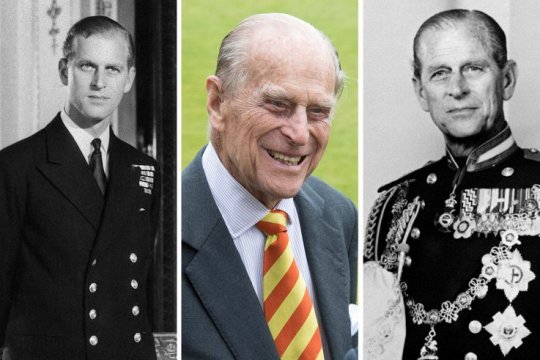
Contrary to what some might think I’m not really a fan girl when it comes to the royal family. I don’t religiously follow their every movement or utterance especially as I live in Paris and therefore I don’t really care about tabloid tittle tattle. I only get to hear of anything to do with the royal family when I speak to my parents or my great aunts and uncles for whom the subject is closer to their heart because of the services my family has rendered over past generations to the monarchy and the older (and dying) tight knit social circles they travel in.
Like Walter Bagehot, I’m more interested in the monarchy as an institution and its constitutional place within the historical, social, and political fabric of Britain and its continued delicate stabilising importance to that effect. It was Walter Bagehot, the great constitutional scholar and editor the Economist magazine, who said, “The mystic reverence, the religious allegiance, which are essential to a true monarchy, are imaginative sentiments that no legislature can manufacture in any people.” In his view, a politically-inactive monarchy served the best interests of the United Kingdom; by abstaining from direct rule, the monarch levitated above the political fray with dignity, and remained a respected personage to whom all subjects could look to as a guiding light.
Even as a staunch monarchist I freely confess that there has always been this odd nature of the relationship between hereditary monarchy and a society increasingly ambivalent about the institution. To paraphrase Bagehot again, there has been too much ‘daylight’ shone onto the ‘magic’ of the monarchy because we are obsessed with personalities as celebrities.
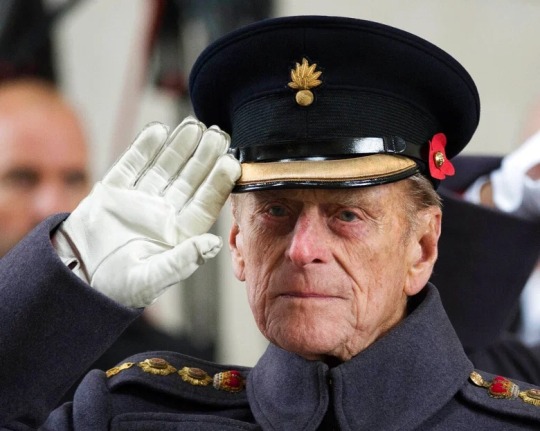
Having said that I did feel saddened by the passing of Prince Philip, the Duke of Edinburgh. After the Queen, he was my favourite royal. Anne, Princess Royal, would come next because she is very much like her father in temperament, humour, and character, so unlike her other brothers.
I have met the late Prince Philip when I was serving in the army in a few regimental meet-and-greet situations - which as you may know is pretty normal given that members of the royal family serve as honorary colonel-in-chiefs (patrons in effect) of all the British army regiments and corps.I also saw him at one or two social events such the annual charitable Royal Caledonian Ball (he’s an expert scottish reeler) and the Guards Polo Club where my older brothers played.
I’ll will freely confess that he was the one royal I could come close to identify with because his personal biography resonated with me a great deal.
Let’s be honest, the core Windsor family members, born to privilege, are conditioned and raised to be dull. Perhaps that’s a a tad harsh. I would prefer the term ‘anonymously self-effacing’, just another way of saying ‘for God’s sake don’t draw attention to yourself by saying or doing anything even mildly scandalous or political lest it invites public opprobrium and scrutiny’. The Queen magnificently succeeds in this but the others from Charles down just haven’t (with the exception of Princess Anne).
However, many people forget this obvious fact that it’s the incoming husbands and wives who marry into the Windsor family who are relied upon to bring colour and even liven things up a little. And long before Kate Middleton, Meghan Markle (very briefly), or Lady Diana Spencer, were the stars of ‘The Firm’- a phrase first coined by King George VI, Queen Elizabeth II's father who ruled from 1936 to 1952, who was thought to have wryly said, "British royals are 'not a family, we're a firm,” - it was Prince Philip who really livened things up and made the greater impact on the monarchy than any of them in the long term.
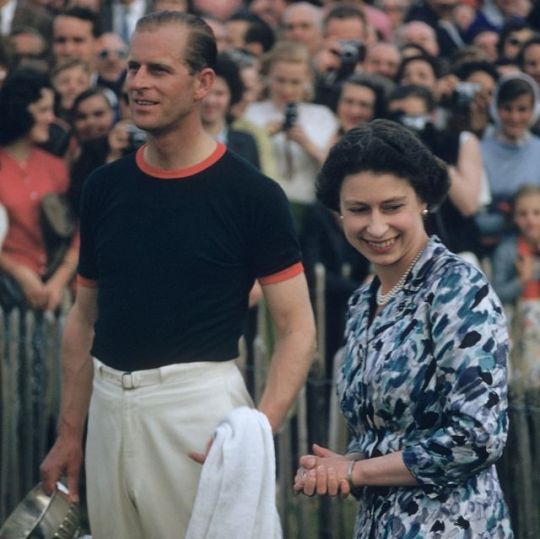
Prince Philip’s passing belied the truth of a far more complex individual: a destitute and penniless refugee Greek-Danish prince with a heart breaking backstory that could have been penned by any 19th Century novelist, and also eagle eyed reformer who tried to drag the royal family into the 20th century. At the core of the man - lost scion of a lost European royal dynasty, a courageous war veteran, and Queen’s consort - were values in which he attempted to transform and yet maintain much older inherited traditions and attitudes. Due to his great longevity, Philip’s life came to span a period of social change that is almost unprecedented, and almost no one in history viewed such a transformation from the front row.
Prince Philip would seem to represent in an acute form the best of the values of that era, which in many ways jar with today’s. He had fought with great courage in the war as a dashing young naval officer; he was regularly rude to foreigners, which was obviously a bonus to all Brits. He liked to ride and sail and shoot things. He was unsentimental almost to a comic degree, which felt reassuring at a time when a new-found emotional incontinence made many feel uncomfortable. Outrageous to some but endearing to others, he was the sort of man you’d want to go for a pint with, perhaps the ultimate compliment that an Englishman can pay to another Englishman. This has its own delicious irony as he wasn’t really an Englishman.
There are 4 takeways I would suggest in my appraisal of Prince Philip that stand out for me. So let me go through each one.
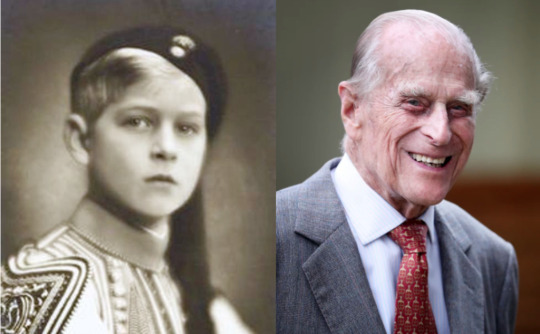
1. Prince Philip’s Internationalism
It may seem odd for me to say that Prince Philip wasn’t English but he wasn’t an Englishman in any real sense. He was a wretch of the world - stateless, homeless, and penniless. That the Prince of Nowhere became the British Monarchy’s figurehead was more than fitting for a great age of migration and transition in which the Royal Family survived and even flourished. That he was able to transform himself into the quintessential Englishman is testimony not just to his personal determination but also to the powerful cultural pull of Britishness.
He was born on a kitchen table in Corfu in June 1921. A year later in 1922, Philip, as the the great-great-grandson of Queen Victoria and nephew of Constantine I of Greece, was forced to flee with his family after the abdication of Constantine. He grew up outside Paris speaking French; ethnically he was mostly German although he considered himself Danish, his family originating from the Schleswig border region. He was in effect, despite his demeanour of Royal Navy officer briskness, a citizen of nowhere in an age of movement. From a very young age he was a stateless person, nationally homeless. Indeed, Philip was an outsider in a way that even Meghan Markle could never be; at his wedding in 1947, his three surviving sisters and two brothers-in-law were not permitted to attend because they were literally Britain’s enemies, having fought for the Germans. A third brother-in-law had even been in the SS, working directly for Himmler, but had been killed in the conflict.
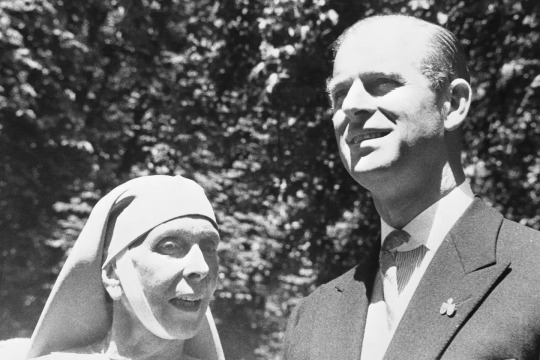
Even his religion was slightly exotic. He was Greek Orthodox until he converted to Anglicanism on marrying Elizabeth - what with his wife due to become supreme head of the Church and everything - but his ties with eastern Christianity remained. His great-aunts Princess Elisabeth of Hesse and by Rhine and Tsarina Alexandra are both martyrs of the Russian Orthodox Church, having been murdered by the Bolsheviks; Philip’s mother went on to become an Orthodox nun and a “Righteous Among the Nations” for saving a Jewish family during the Nazi occupation of Greece, spending much of her time in squalid poverty.
His parents were part of the largely German extended aristocracy who ruled almost all of Europe before it all came crashing down in 1918. When he died, aged 99, it marked a near-century in which all the great ideological struggles had been and gone; he had been born before the Soviet Union but outlived the Cold War, the War on Terror and - almost - Covid-19.
The world that Philip was born into was a far more violent and dangerous place than ours. In the year he was born, Irish rebels were still fighting Black and Tans; over the course of 12 months the Spanish and Japanese prime ministers were assassinated, there was a coup in Portugal and race riots in the United States. Germany was rocked by violence from the far-Left and far-Right, while in Italy a brutal new political movement, the Fascists, secured 30 seats in parliament, led by a trashy journalist called Benito Mussolini.
The worst violence, however, took place in Greece and Turkey. Following the defeat of the Ottoman Empire, what remained of Turkey was marked for permanent enfeeblement by the Allies. But much to everyone’s surprise the country’s force were roused by the brilliant officer Mustafa Kemal, who led the Turks to victory. Constantinople was lost to Christendom for good and thousands of years of Hellenic culture was put to the flames in Smyrna.
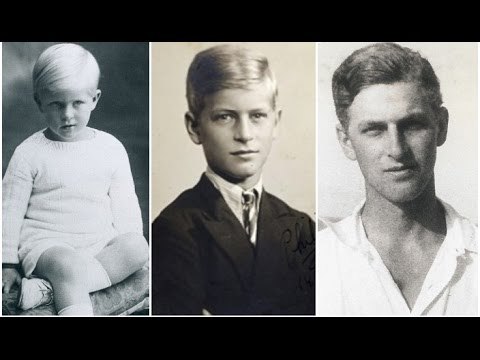
The Greek royal family, north German imports shipped in during the 19th century, bore much of the popular anger for this disaster. King Constantine fled to Italy, and his brother Andrew was arrested and only escaped execution through the intervention of his relative Britain’s George V. Andrew’s wife Alice, their four daughters and infant son Philip fled to France, completely impoverished but with the one possession that ensures that aristocrats are never truly poor: connections.
Philip had a traumatic childhood. He was forged by the turmoil of his first decade and then moulded by his schooling. His early years were spent wandering, as his place of birth ejected him, his family disintegrated and he moved from country to country, none of them ever his own. When he was just a year old, he and his family were scooped up by a British destroyer from his home on the Greek island of Corfu after his father had been condemned to death. They were deposited in Italy. One of Philip's first international journeys was spent crawling around on the floor of the train from an Italian port city, "the grubby child on the desolate train pulling out of the Brindisi night," as his older sister Sophia later described it.
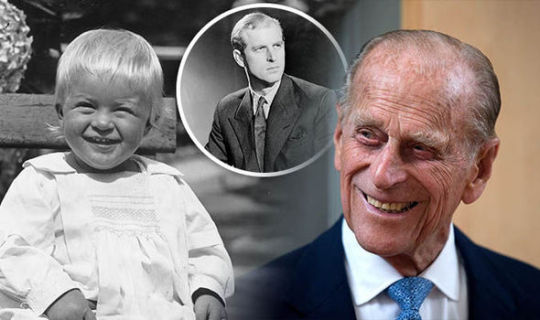
In Paris, he lived in a house borrowed from a relative; but it was not destined to become a home. In just one year, while he was at boarding school in Britain, the mental health of his mother, Princess Alice, deteriorated and she went into an asylum; his father, Prince Andrew, went off to Monte Carlo to live with his mistress. "I don't think anybody thinks I had a father," he once said. Andrew would die during the war. Philip went to Monte Carlo to pick up his father's possessions after the Germans had been driven from France; there was almost nothing left, just a couple of clothes brushes and some cuff-links.
Philip’s four sisters were all much older, and were soon all married to German aristocrats (the youngest would soon die in an aeroplane crash, along with her husband and children). His sisters became ever more embroiled in the German regime. In Scotland going to Gordonstoun boarding school, Philip went the opposite direction, becoming ever more British. Following the death of his sister Cecilie in a plane crash in 1937, the gulf widened. As the clouds of conflict gathered, the family simply disintegrated. With a flash of the flinty stoicism that many would later interpret, with no little justification, as self-reliance to the point of dispassion, the prince explained: “It’s simply what happened. The family broke up… I just had to get on with it. You do. One does.”
In the space of 10 years he had gone from a prince of Greece to a wandering, homeless, and virtually penniless boy with no-one to care for him. He got through it by making a joke of everything, and by being practical.
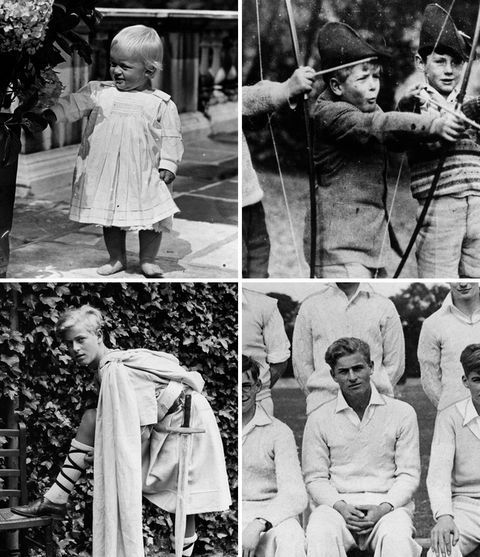
By the time he went to Gordonstoun, a private boarding school on the north coast of Scotland, Philip was tough, independent and able to fend for himself; he'd had to be. Gordonstoun would channel those traits into the school's distinct philosophy of community service, teamwork, responsibility and respect for the individual. And it sparked one of the great passions of Philip's life - his love of the sea. It was Gordonstoun that nurtured that love through the maturation of his character.
Philip adored the school as much as his son Charles would despise it. Not just because the stress it put on physical as well as mental excellence - he was a great sportsman. But because of its ethos, laid down by its founder Kurt Hahn, a Jewish exile from Nazi Germany.
Hahn first met Philip as a boy in Nazi Germany. Through a connection via one of his sister’s husbands, Philip, the poor, lonely boy was first sent off to a new school - in Nazi Germany. Which was as fun as can be imagined. Schloss Salem had been co-founded by stern educator called Kurt Hahn, a tough, discipline-obsessed conservative nationalist who saw civilisation in inexorable decline. But by this stage Hahn, persecuted for being Jewish in Nazi Germany, had fled to Britain, and Philip did not spend long at the school either, where pressure from the authorities was already making things difficult for the teachers. Philip laughed at the Nazis at first, because their salute was the same gesture the boys at his previous school had to make when they wanted to go to the toilet, but within a year he was back in England, a refugee once again.
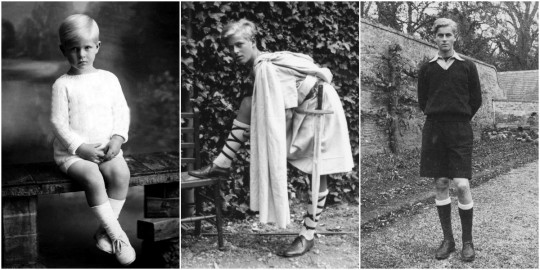
Philip happily attended Hahn’s new school, Gordonstoun, which the strict disciplinarian had set up in the Scottish Highlands. Inspired by Ancient Sparta, the boys (and then later girls) had to run around barefoot and endure cold showers, even in winter, the whole aim of which was to drive away the inevitable civilisational decay Hahn saw all around him. To 21st century ears it sounds like hell on earth, yet Philip enjoyed it, illustrating just what a totally alien world he came from.
That ethos became a significant, perhaps the significant, part of the way that Philip believed life should be lived. It shines through the speeches he gave later in his life. "The essence of freedom," he would say in Ghana in 1958, "is discipline and self-control." The comforts of the post-war era, he told the British Schools Exploring Society a year earlier, may be important "but it is much more important that the human spirit should not be stifled by easy living". And two years before that, he spoke to the boys of Ipswich School of the moral as well as material imperatives of life, with the "importance of the individual" as the "guiding principle of our society".
It was at Gordonstoun one of the great contradictions of Philip's fascinating life was born. The importance of the individual was what in Kurt Hahn's eyes differentiated Britain and liberal democracies from the kind of totalitarian dictatorship that he had fled. Philip put that centrality of the individual, and individual agency - the ability we have as humans to make our own moral and ethical decisions - at the heart of his philosophy.
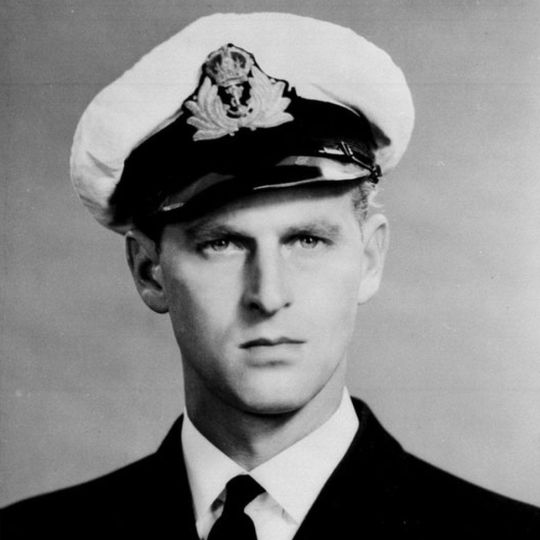
At Dartmouth Naval College in 1939, the two great passions of his life would collide. He had learned to sail at Gordonstoun; he would learn to lead at Dartmouth. And his driving desire to achieve, and to win, would shine through. Despite entering the college far later than most other cadets, he would graduate top of his class in 1940. In further training at Portsmouth, he gained the top grade in four out of five sections of the exam. He became one of the youngest first lieutenants in the Royal Navy.
The navy ran deep in his family. His maternal grandfather had been the First Sea Lord, the commander of the Royal Navy; his uncle, "Dickie" Mountbatten, had command of a destroyer while Philip was in training. In war, he showed not only bravery but guile. It was his natural milieu. "Prince Philip", wrote Gordonstoun headmaster Kurt Hahn admiringly, "will make his mark in any profession where he will have to prove himself in a trial of strength".
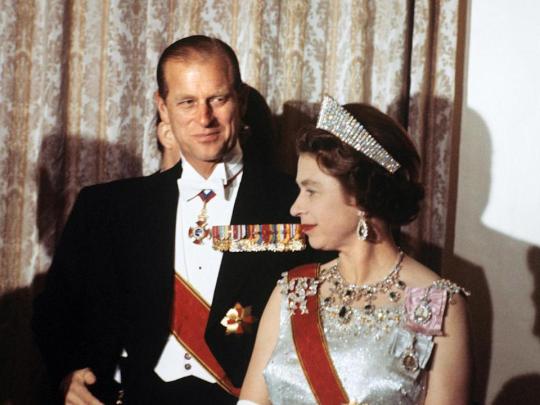
2. Prince Philip and the modernisation of the monarchy
In his own words, the process of defining what it meant to be a royal consort was one of “trial and error.” Speaking with BBC One’s Fiona Bruce in 2011, Philip explained, “There was no precedent. If I asked somebody, 'What do you expect me to do?' they all looked blank. They had no bloody idea, nobody had much idea.” So he forged for himself a role as a moderniser of the monarchy.
He could not have had much idea back in 1939. Back then in Dartmouth in 1939, as war became ever more certain, the navy was his destiny. He had fallen in love with the sea itself. "It is an extraordinary master or mistress," he would say later, "it has such extraordinary moods." But a rival to the sea would come.
When King George VI toured Dartmouth Naval College, accompanied by Philip's uncle, he brought with him his daughter, Princess Elizabeth. Philip was asked to look after her. He showed off to her, vaulting the nets of the tennis court in the grounds of the college. He was confident, outgoing, strikingly handsome, of royal blood if without a throne. She was beautiful, a little sheltered, a little serious, and very smitten by Philip.
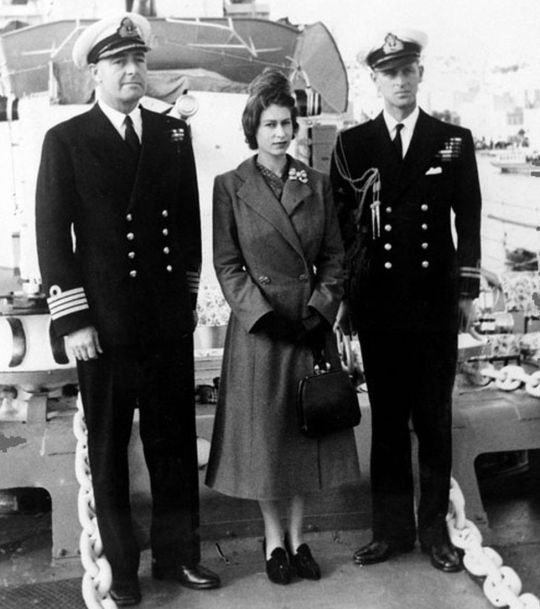
Did he know then that this was a collision of two great passions? That he could not have the sea and the beautiful young woman? For a time after their wedding in 1948, he did have both. As young newlyweds in Malta, he had what he so prized - command of a ship - and they had two idyllic years together. But the illness and then early death of King George VI brought it all to an end.
He knew what it meant, the moment he was told. Up in a lodge in Kenya, touring Africa, with Princess Elizabeth in place of the King, Philip was told first of the monarch's death in February 1952. He looked, said his equerry Mike Parker, "as if a ton of bricks had fallen on him". For some time he sat, slumped in a chair, a newspaper covering his head and chest. His princess had become the Queen. His world had changed irrevocably.
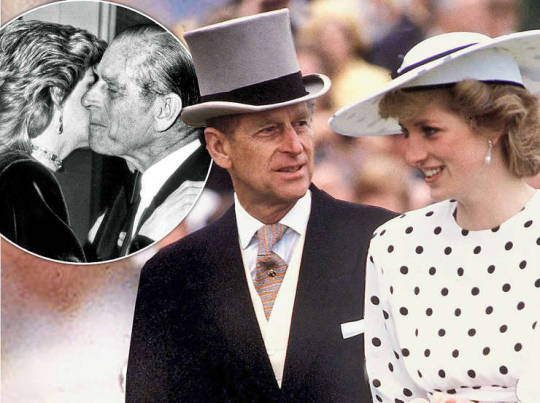
While the late Princess Diana was later to famously claim that there were “three people” in her marriage - herself, Prince Charles and Camilla - there were at least 55 million in Philip and Elizabeth’s. As Elizabeth dedicated her life to her people at Westminster Abbey at the Coronation on June 2, 1953, it sparked something of an existential crisis in Philip. Many people even after his death have never really understood this pivotal moment in Philip’s life. All his dreams of being a naval officer and a life at sea as well as being the primary provider and partner in his marriage were now sacrificed on the altar of duty and love.
With his career was now over, and he was now destined to become the spare part. Philip, very reasonably, asked that his future children and indeed his family be known by his name, Mountbatten. In effect he was asking to change the royal family’s name from the House of Windsor to the House of Mountbatten. But when Prime Minister Winston Churchill got wind of it as well as the more politically agile courtiers behind the Queen, a prolonged battle of wits ensued, and it was one Philip ultimately lost. It was only in 1957 that he accepted the title of “Prince.”
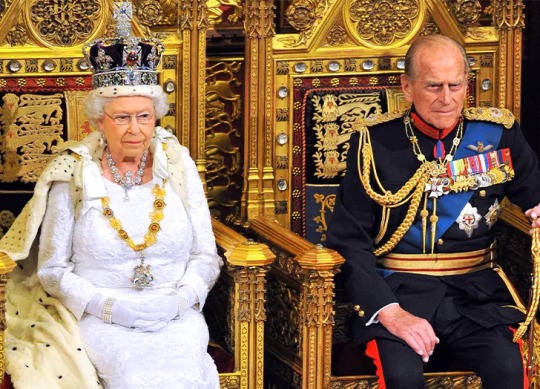
Even though he had almost lost everything dear to him and his role now undefined, he didn’t throw himself a pity party. He just got on with it. Philip tried to forge his own distinct role as second fiddle to the woman who had come to represent Great Britain. He designated himself the First Officer of the Good Ship Windsor. He set about dusting off some of the cobwebs off the throne and letting some daylight unto the workings of the monarchy by advocating reasonable amount of modernisation of the monarchy.
He had ideas about modernising the royal family that might be called “improving optics” today. But in his heart of hearts he didn’t want the monarchy to become a stuffy museum piece. He envisaged a less stuffy and more popular monarchy, relevant to the lives of ordinary people. Progress was always going to be incremental as he had sturdy opposition from the old guard who wanted to keep everything as it was, but nevertheless his stubborn energy resulted in significant changes.
When a commission chaired by Prince Philip proposed broadcasting the 1953 investiture ceremony that formally named Elizabeth II as queen on live television, Prime Minister Winston Churchill reacted with outright horror, declaring, “It would be unfitting that the whole ceremony should be presented as if it were a theatrical performance.” Though the queen had initially voiced similar concerns, she eventually came around to the idea, allowing the broadcast of all but one segment of the coronation. Ultimately, according to the BBC, more than 20 million people tuned in to the televised ceremony - a credit to the foresight of Philip.
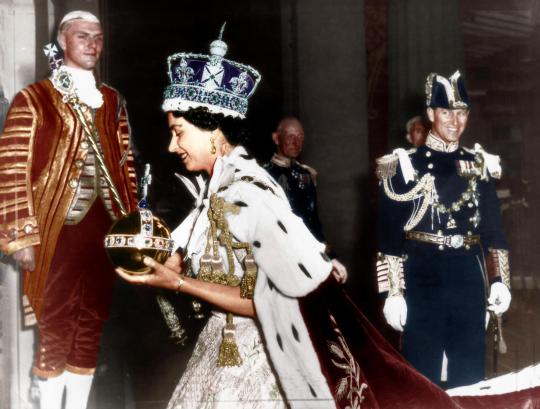
Elizabeth’s coronation marked a watershed moment for a monarchy that has, historically, been very hands off, old-fashioned and slightly invisible. Over the following years, the royals continued to embrace television as a way of connecting with the British people: In 1957, the queen delivered her annual Christmas address during a live broadcast. Again, this was Philip’s doing when he cajoled the Queen to televise her message live. He even helped her in how to use the teleprompter to get over her nerves and be herself on screen.
Four years later, in 1961, Philip became the first family member to sit for a television interview. It is hard for us to imagine now but back then it was huge. For many it was a significant step in modernising the monarchy.
Though not everything went to plan. Toward the end of the decade, the Windsors even invited cameras into their home. A 1969 BBC fly-on-the-wall documentary, instigated by Philip to show life behind the scenes, turned into an unmitigated disaster: “The Windsors” revealed the royals to be a fairly normal, if very rich, British upper-class family who liked barbecues, ice cream, watching television and bickering. The mystery of royalty took a hit below the waterline from their own torpedo, a self-inflicted wound from which they took a long time to recover. Shown once, the documentary was never aired again. But it had an irreversible effect, and not just by revealing the royals to be ordinary. By allowing the cameras in, Philip opened the lid to the prying eyes of the paparazzi who could legitimately argue that since the Royals themselves had sanctioned exposure, anything went. From then on, minor members of the House of Windsor were picked off by the press, like helpless tethered animals on a hunting safari.
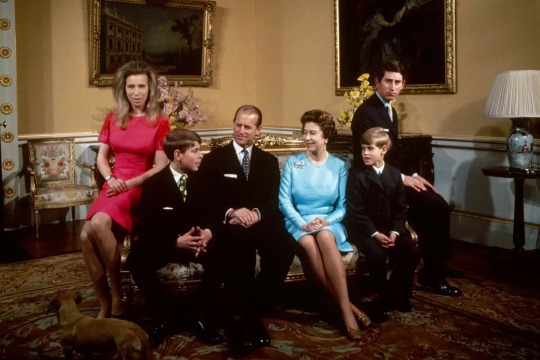
Prince Philip also took steps to reorganise and renovate the royal estates in Sandringham and Balmoral such as intercoms, modern dish washers, generally sought to make the royal household and the monarchy less stuffy, not to have so much formality everywhere.
Philip helped modernised the monarchy in other ways to acknowledge that the monarchy could be responsive to changes in society. It was Prince Philip - much to the chagrin of the haughty Princess Margaret and other stuffy old courtiers - who persuaded the Queen to host informal lunches and garden parties designed to engage a broader swath of the British public. Conversely, Prince Philip heartily encouraged the Queen (she was all for it apparently but was still finding her feet as a new monarch) to end the traditional practice of presenting debutantes from aristocratic backgrounds at court in 1952. For Philip and others it felt antiquated and out of touch with society. I know in speaking to my grandmother and others in her generation the decision was received with disbelief at how this foreign penniless upstart could come and stomp on the dreams of mothers left to clutch their pearls at the prospect there would be no shop window for their daughter to attract a suitable gentleman for marriage. One of my great aunts was over the moon happy that she never would have to go through what she saw as a very silly ceremony because she preferred her muddy wellies to high heels.

A former senior member of the royal household, who spent several years working as one of Prince Philip’s aides, and an old family friend, once told us around a family dinner table that the Duke of Edinburgh was undoubtedly given a sense of permanence by his marriage into the Royal Family that was missing from earlier years. But the royal aide would hastily add that Prince Philip, of course, would never see it that way.
Prince Philip’s attitude was to never brood on things or seek excuses. And he did indeed get on with the job in his own way - there should be no doubt that when it came to building and strengthening the Royal Family it was a partnership of equals with the Queen. Indeed contrary to Netflix’s hugely popular series ‘The Crown’ and its depiction of the royal marriage with Philip’s resentment at playing second fiddle, the prince recognised that his “first duty was to serve the Queen in the best way I could,” as he told ITV in 2011. Though this role was somewhat ill-suited to his dynamic, driven, and outspoken temperament, Philip performed it with utter devotion.
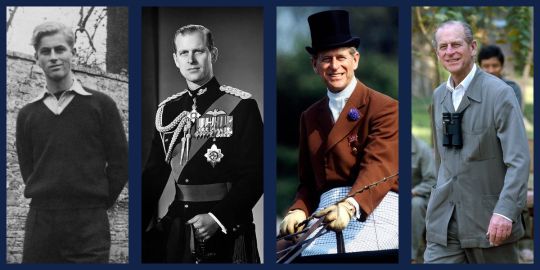
3. Prince Philip’s legacy
One could argue rightly that modernising the monarchy was his lasting legacy achievement. But he also tried to modernise a spent and exhausted Britain as it emerged from a ruinous war. When peace came, and with it eventual economic recovery, Philip would throw himself into the construction of a better Britain, urging the country to adopt scientific methods, embracing the ideas of industrial design, planning, education and training. A decade before Harold Wilson talked of the "white heat of the technological revolution", Philip was urging modernity on the nation in speeches and interviews. He was on top of his reading of the latest scientific breakthroughs and well read in break out innovations.
This interest in modernisation was only matched by his love for nature. As the country and the world became richer and consumed ever more, Philip warned of the impact on the environment, well before it was even vaguely fashionable. As president of the World Wildlife Fund (WWF) in the UK for more than 20 years from 1961, he was one of the first high-profile advocates of the cause of conservation and biological diversity at a time when it was considered the preserve of an eccentric few.
For a generation of school children in Britain and the Commonwealth though, his most lasting legacy and achievement will be the Duke of Edinburgh Awards (DofE). He set up the Duke of Edinburgh award, a scheme aimed at getting young people out into nature in search of adventure or be of service to their communities. It was a scheme that could match the legacy of Baden Powell’s scouts movement.
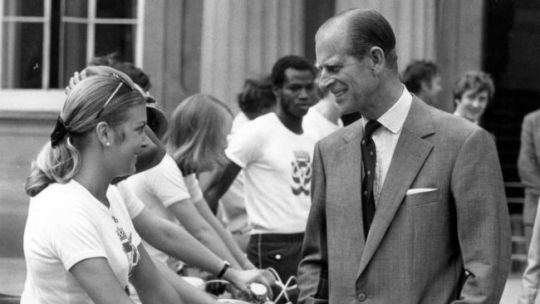
When Prince Philip first outlined his idea of a scheme to harness the values of his education at Gordonstoun by bringing character-building outdoor pursuits to the many rather than the fee-paying few, he received short shrift from the government of the day. The then minister of education, Sir David Eccles responded to the Duke’s proposal by saying: “I hear you’re trying to invent something like the Hitler Youth.” Undeterred he pushed on until it came to fruition.
I’m so glad that he did. I remember how proud I was for getting my DofE Awards while I was at boarding school. With the support of great mentors I managed to achieve my goals: collecting second-hand English books for a literacy programme for orphaned street children in Delhi, India with a close Indian school friend and her family; and completing a 350 mile hike following St. Olav’s Pilgrimmage Trail from Selånger, on the east coast of Sweden, and ending at Nidaros Cathedral in Trondheim, on the west coast of Norway.
It continues to be an enduring legacy. Since its launch in 1956, the Duke of Edinburgh awards have been bestowed upon some 2.5 million youngsters in Britain and some eight million worldwide. For a man who once referred to himself as a “Greek princeling of no consequence”, his pioneering tutelage of these two organisations (alongside some 778 other organisations of which he was either president or a patron) would be sufficient legacy for most.
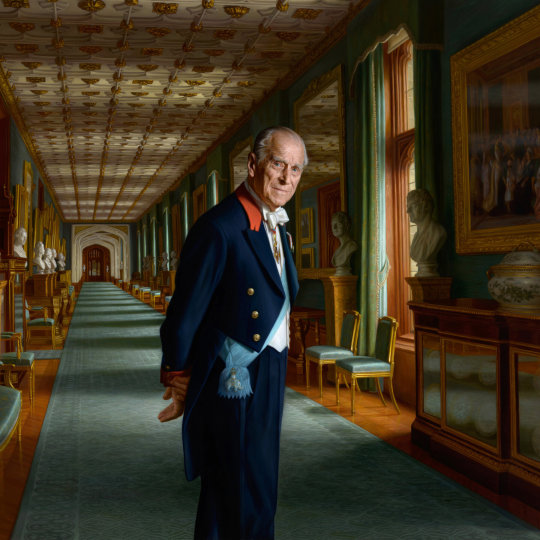
4. Prince Philip’s character
It may surprise some but what I liked most about Prince Philip was the very thing that helped him achieve so much and leave a lasting legacy: his character.
It is unhelpful to the caricature of Prince Philip as an unwavering but pugnacious consort whose chief talent was a dizzying facility in off-colour one-liners that he was widely read and probably the cleverest member of his family.
His private library at Windsor consists of 11,000 tomes, among them 200 volumes of poetry. He was a fan of Jung, TS Eliot, Shakespeare and the cookery writer Elizabeth David. As well as a lifelong fascination with science, technology and sport, he spoke fairly fluent French, painted and wrote a well received book on birds. It’s maddening to think how many underestimated his genuine intellect and how cultured he was behind the crusty exterior.
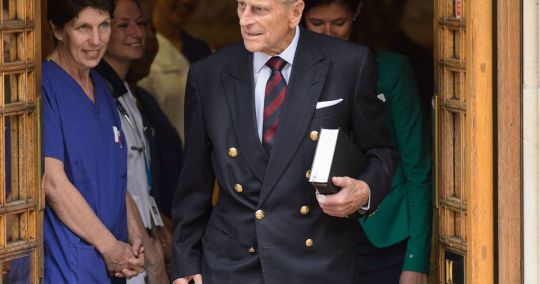
He didn’t have an entourage to fawn around him. He was the first to own a computer at Buckingham Palace. He answered his own phone and wrote and responded to his own correspondence. By force of character he fought the old guard courtiers at every turn to modernise the monarchy against their stubborn resistance.
Prince Philip was never given to self-analysis or reflection on the past. Various television interviewers tried without success to coerce him in to commenting on his legacy.But once when his guard was down he asked on the occasion of his 90th birthday what he was more proud of, he replied with characteristic bluntness: “I couldn’t care less. Who cares what I think about it, I mean it’s ridiculous.”
All of which neatly raises the profound aversion to fuss and the proclivity for tetchiness often expressed in withering put-downs that, for better or worse, will be the reflex memory for many of the Duke of Edinburgh. If character is a two edged sword so what of his gaffes?
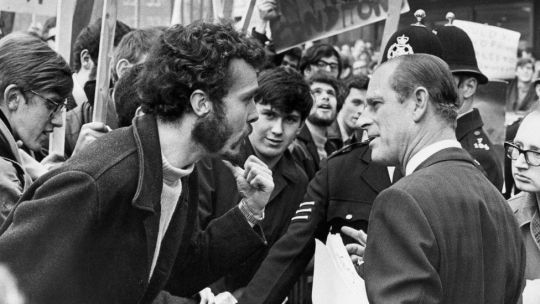
There is no doubt his cult status partly owed to his so-called legendary gaffes, of which there are enough to fill a book (indeed there is a book). But he was no racist. None of the Commonwealth people or foreign heads of state ever said this about him. Only leftist republicans with too much Twitter time on their hands screamed such a ridiculous accusation. They’re just overly sensitive snowflakes and being devoid of any humour they’re easily triggered.
There was the time that Philip accepted a gift from a local in Kenya, telling her she was a kind woman, and then adding: “You are a woman, aren’t you?” Or the occasion he remarked “You managed not to get eaten, then?” to a student trekking in Papua New Guinea. Then there was his World Wildlife Fund speech in 1986, when he said: “If it has got four legs and it is not a chair, if it has got two wings and it flies but is not an aeroplane, and if it swims and it is not a submarine, the Cantonese will eat it.” Well, he wasn’t wrong.
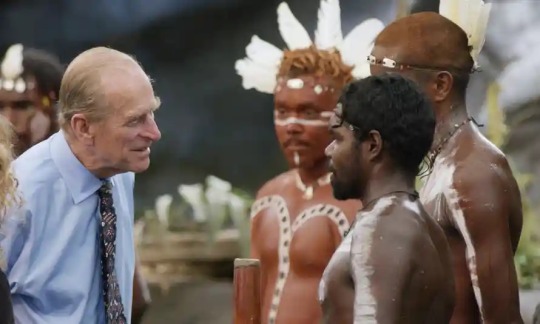
Philip quickly developed a reputation for what he once defined, to the General Dental Council, as “dentopedology – the science of opening your mouth and putting your foot in it”. Clearly he could laugh at himself as he often did as an ice breaker to put others at ease.
His remarking to the president of Nigeria, who was wearing national dress, “You look like you’re ready for bed”, or advising British students in China not to stay too long or they would end up with “slitty eyes”, is probably best written off as ill-judged humour. Telling a photographer to “just take the fucking picture” or declaring “this thing open, whatever it is”, were expressions of exasperation or weariness with which anyone might sympathise.
Above all, he was also capable of genuine if earthy wit, saying of his horse-loving daughter Princess Anne: “If it doesn’t fart or eat hay she isn’t interested.” Many people might have thought it but few dared say it. If Prince Philip’s famous gaffes provoked as much amusement as anger, it was precisely because they seem to give voice to the bewilderment and pent-up frustrations with which many people viewed the ever-changing modern world.
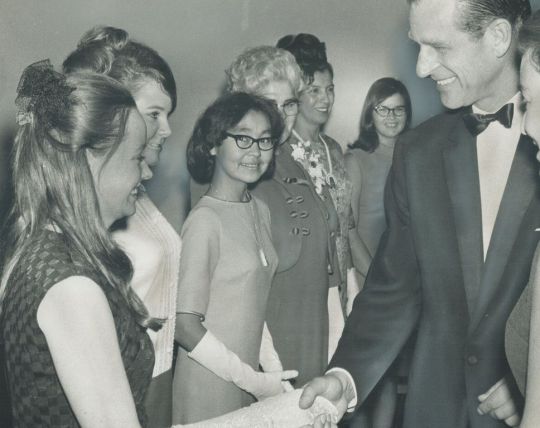
A former royal protection officer recounts how while on night duty guarding a visiting Queen and consort, he engaged in conversation with colleagues on a passing patrol. It was 2am and the officer had understood the royal couple to be staying elsewhere in the building until a window above his head was abruptly slammed open and an irate Prince Philip stuck his head out of the window to shout: “Would you fuck off!” Without another word, he then shut the window.
The Duke at least recognised from an early age that he was possessed of an abruptness that could all too easily cross the line from the refreshingly salty to crass effrontery.
One of his most perceptive biographers, Philip Eade, recounted how at the age of 21 the prince wrote a letter to a relation whose son had recently been killed in combat. He wrote: “I know you will never think much of me. I am rude and unmannerly and I say things out of turn which I realise afterwards must have hurt someone. Then I am filled with remorse and I try to put matters right.”
In the case of the royal protection officer, the Duke turned up in the room used by the police officers when off duty and said: “Terribly sorry about last night, wasn’t quite feeling myself.”
Aides have also ventured to explain away some of their employer’s more outlandish remarks - from asking Cayman islanders “You are descended from pirates aren’t you?” to enquiring of a female fashion writer if she was wearing mink knickers - as the price of his instinctive desire to prick the pomposity of his presence with a quip to put others at ease.
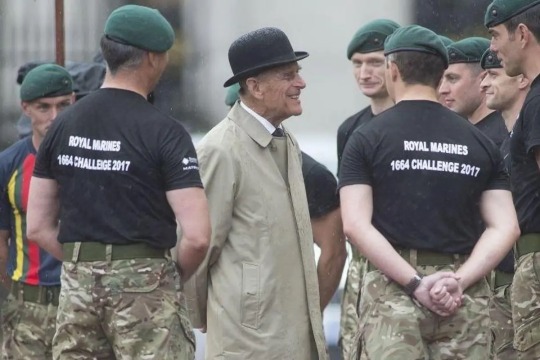
Indeed many people forget that his ‘gaffes’ were more typical of the clubbish humour of the British officer class – which of course would be less appreciated, sometimes even offensive, to other ears. It’s why he could relate so well to veterans who enjoyed his bonhomie company immensely.
But behind the irascibility, some have argued there also lay a darker nature, unpleasantly distilled in his flinty attitude to his eldest son. One anecdote tells of how, in the aftermath of the murder of the Duke’s uncle and surrogate father, Lord Mountbatten, Philip lectured his son, who was also extremely fond of his “honorary grandfather”, that he was not to succumb to self-pity. Charles left the room in tears and when his father was asked why he had spoken to his son with so little compassion, the Duke replied: “Because if there’s any crying to be done I want it to happen within this house, in front of his family, not in public. He must be toughened up, right now.”
But here I would say that Prince Philip’s intentions were almost always sincere and in no way cruel. He has always tried to protect his family - even from their own worst selves or from those outside the family ‘firm’ who may not have their best interest at heart.
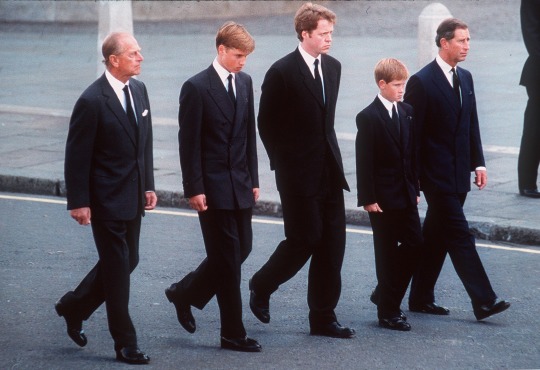
In 1937, a 16-year-old Prince Philip had walked behind his elder sister Cecile’s coffin after she was killed in a plane crash while heavily pregnant. The remains of newly-born infant found in the wreckage suggested the aircraft had perished as the pilot sought to make an emergency landing in fog as the mother entered childbirth. It was an excruciating taste of tragedy which would one day manifest itself in a very princely form of kindness that was deep down that defined Philip’s character.
When about 60 years later Prime Minister Tony Blair’s spin doctors in Downing Street tried to strong arm the Queen and the royal household over the the arrangements for the late Prince Diana’s funeral, it was Philip who stepped in front to protect his family. The Prime Minister and his media savvy spin doctors wanted the two young princes, William and Harry, to walk behind the coffin.
The infamous exchange was on the phone during a conference call between London and Balmoral, and the emotional Philip was reportedly backed by the Queen. The call was witnessed by Anji Hunter, who worked for Mr Blair. She said how surprised she was to hear Prince Philip’s emotion. ‘It’s about the boys,” he cried, “They’ve lost their mother”. Hunter thought to herself, “My God, there’s a bit of suffering going on up there”.’
Sky TV political commentator Adam Boulton (Anji Hunter’s husband) would write in his book Tony’s Ten Years: ‘The Queen relished the moment when Philip bellowed over the speakerphone from Balmoral, “Fuck off. We are talking about two boys who have just lost their mother”. Boulton goes on to say that Philip: ‘…was trying to remind everyone that human feelings were involved. No 10 were trying to help the Royals present things in the best way, but may have seemed insensitive.’
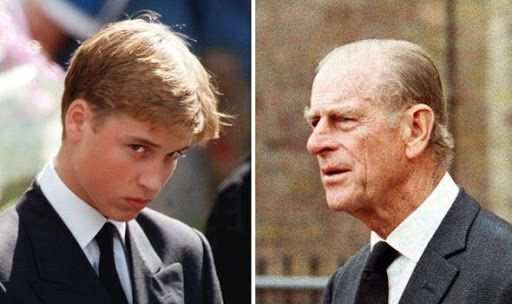
In the end the politicians almost didn’t get their way. Prince Philip stepped in to counsel his grandson, Prince William, after he had expressed a reluctance to follow his mother’s coffin after her death in Paris. Philip told the grieving child: “If you don’t walk, I think you’ll regret it later. If I walk, will you walk with me?”
It’s no wonder he was sought as a counsellor by other senior royals and especially close to his grandchildren, for whom he was a firm favourite. His relationship with Harry was said to have become strained, however, following the younger Prince’s decision to reject his royal inheritance for a life away from the public eye in America with his new American wife, Meghan Markle. For Prince Philip I am quite sure it went against all the elder Prince had lived his life by - self-sacrifice for the greater cause of royalty.
This is the key to Philip’s character and in understanding the man. The ingrained habits of a lifetime of duty and service in one form or another were never far away.
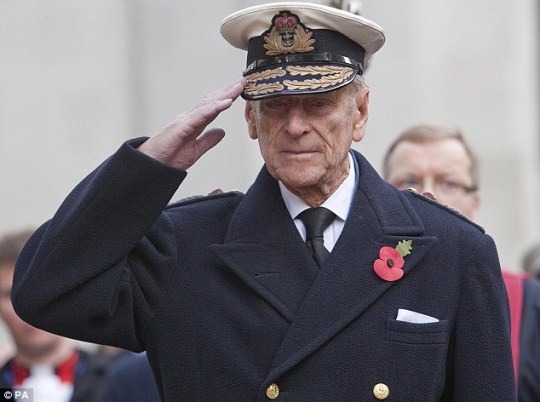
In conclusion then....
After more time passes I am sure historians will make a richer reassessment of Prince Philip’s life and legacy. Because Prince Philip was an extraordinary man who lived an extraordinary life; a life intimately connected with the sweeping changes of our turbulent 20th Century, a life of fascinating contrast and contradiction, of service and some degree of solitude. A complex, clever, eternally restless man that not even the suffocating protocols of royalty and tradition could bind him.
Although he fully accepted the limitations of public royal service, he did not see this as any reason for passive self-abnegation, but actively, if ironically, identified with his potentially undignified role. It is this bold and humorous embrace of fated restriction which many now find irksome: one is no longer supposed to mix public performance with private self-expression in quite this manner.
Yet such a mix is authentically Socratic: the proof that the doing of one’s duty can also be the way of self-fulfilment. The Duke’s sacrifice of career to romance and ceremonial office is all the more impressive for his not hiding some annoyance. The combination of his restless temperament and his deeply felt devotion to duty found fruitful expression; for instance, in the work of Saint George’s House Windsor - a centre and retreat that he created with Revd. Robin Woods - in exploring religious faith, philosophy, and contemporary issues.
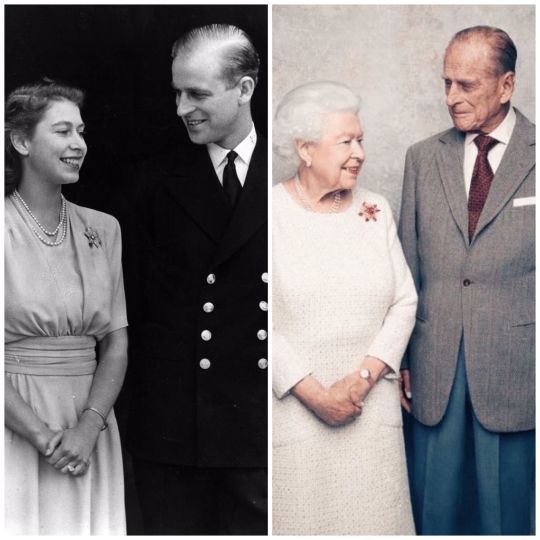
Above all he developed a way to be male that was both traditional and modern. He served one woman with chivalric devotion as his main task in life while fulfilling his public engagements in a bold and active spirit. He eventually embraced the opportunity to read and contemplate more. And yet, he remained loyal to the imperatives of his mentor Kurt Hahn in seeking to combine imagination with action and religious devotion with practical involvement.
Prince Philip took more pride in the roles he had accidentally inherited than in the personal gifts which he was never able fully to develop. He put companionship before self-realisation and acceptance of a sacred symbolic destiny before the mere influencing of events. In all these respects he implicitly rebuked our prevailing meritocracy which over-values officially accredited attainment, and our prevailing narcissism which valorises the assertion of discrete identities.
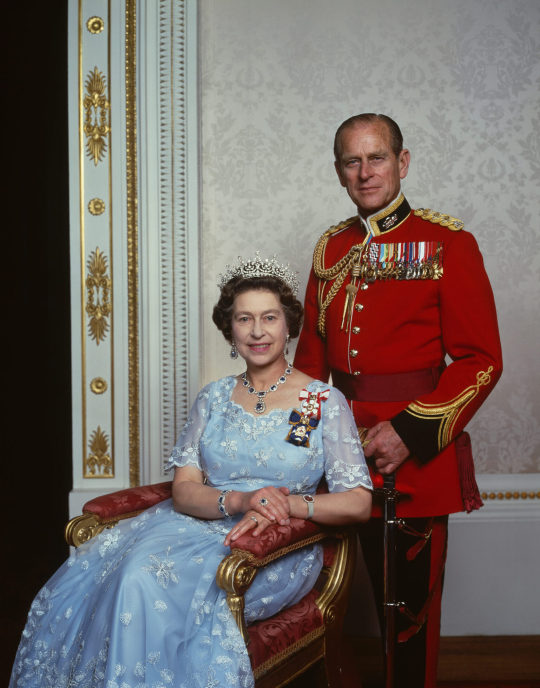
Prince Philip was Britain’s longest-serving consort. He was steadfast, duty driven, and a necessary adjunct to the continuity and stability of the Queen and the monarchy. Of all the institutions that have lost the faith of the British public in this period - the Church, Parliament, the media, the police - the Monarchy itself has surprisingly done better than most at surviving, curiously well-adapted to a period of societal change and moral anarchy. The House of Hanover and later Saxe-Coburg and Gotha (changed to Windsor), since their arrival in this country in 1714, have been noted above all for their ability to adapt. And just as they survived the Victorian age by transforming themselves into the bourgeoise, domestic ideal, so they have survived the new Elizabethan era (Harry-Meghan saga is just a passing blip like the Edward-Wallis Simpson saga of the 1930s).
There was once a time when the Royal’s German blood was a punchline for crude and xenophobic satirists. Now it is the royals who are deeply British while the country itself is increasingly cosmopolitan and globalised. British society has seen a greater demographic change than the preceding four or five thousand years combined, the second Elizabethan age has been characterised more than anything by a transformational movement of people. Prince Philip, the Greek-born, Danish-German persecuted and destitute wanderer who came to become one of the Greatest Britons of the past century, perhaps epitomised that era better than anyone else. And he got through it by making a joke of everything, and by being practical.
I hope I don’t exaggerate when I say that in our troubled times over identity, and our place and purpose in the world, we need to heed his selfless example more than ever.
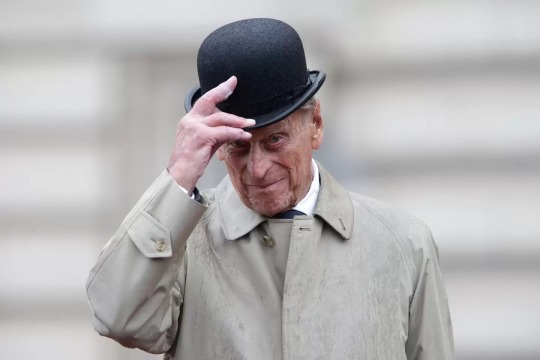
As Heraclitus wisely said, Ήθος ανθρώπω δαίμων (Character is destiny.)
RIP Prince Philip. You were my prince. God damn you, I miss you already.
Thanks for your question.
#question#ask#prince philip#duke of edinburgh#queen elizabeth II#the queen of spades#monarchy#britain#british#royalty#politics#history#culture#europe#crown#icon#great briton#society
284 notes
·
View notes